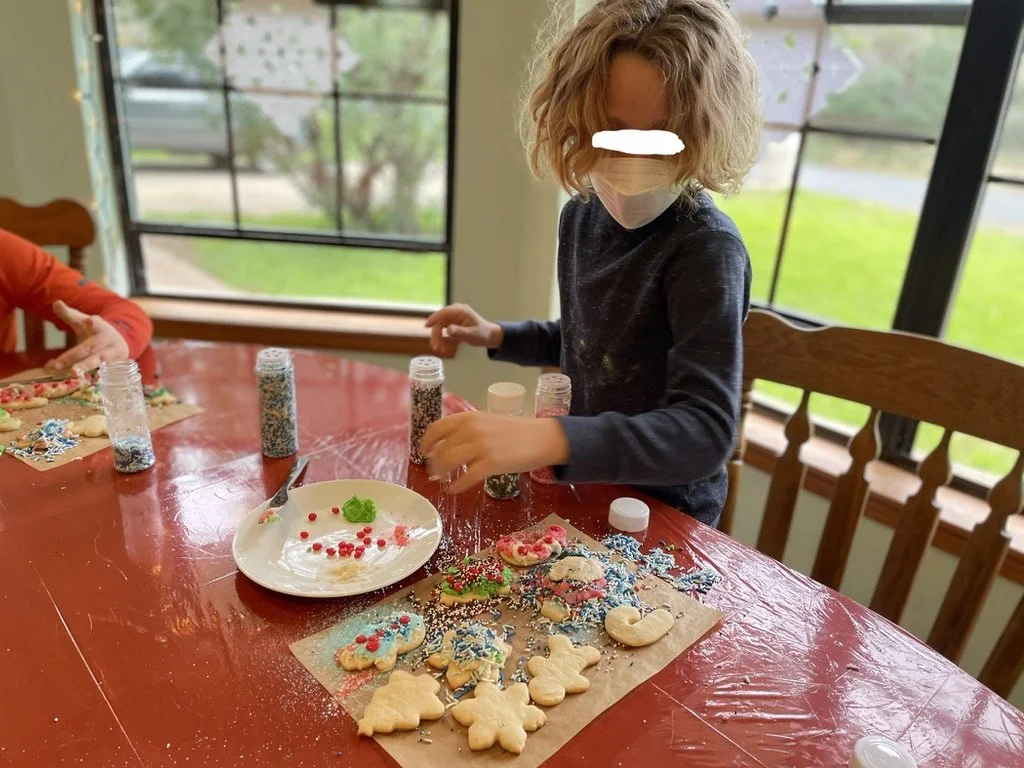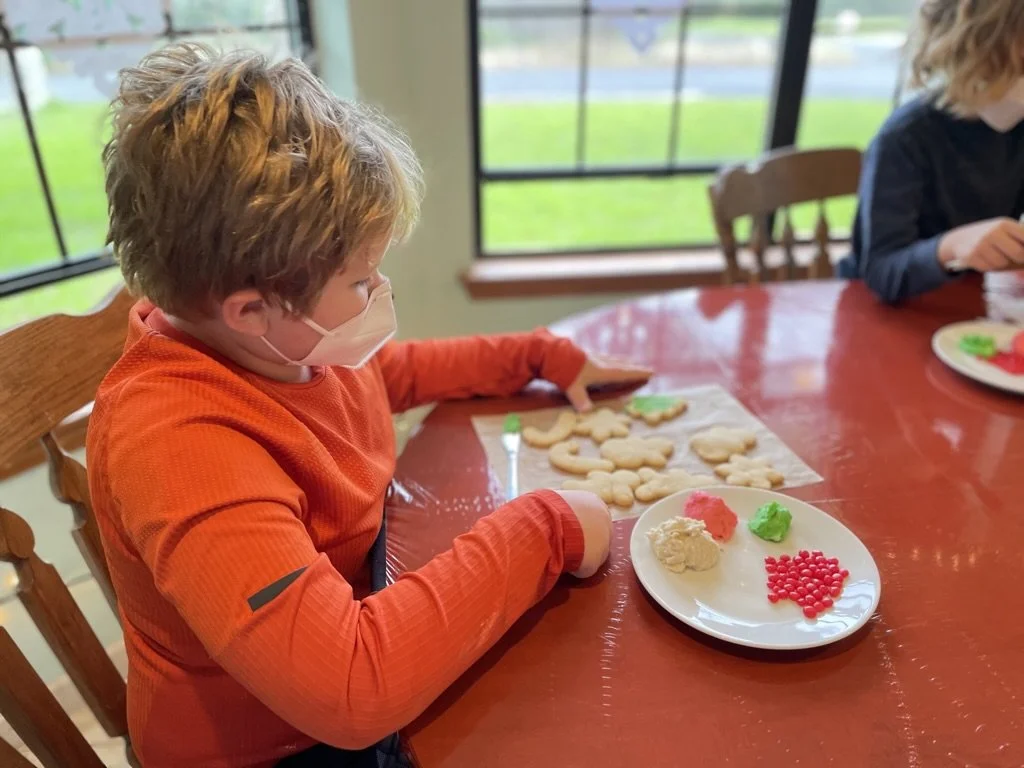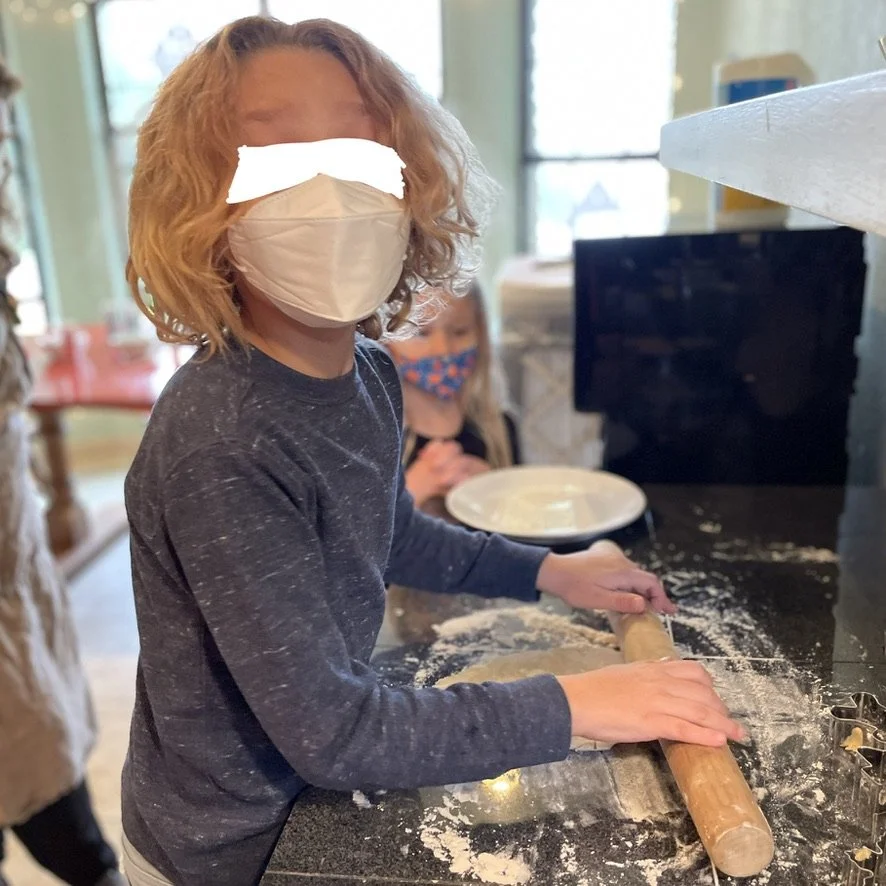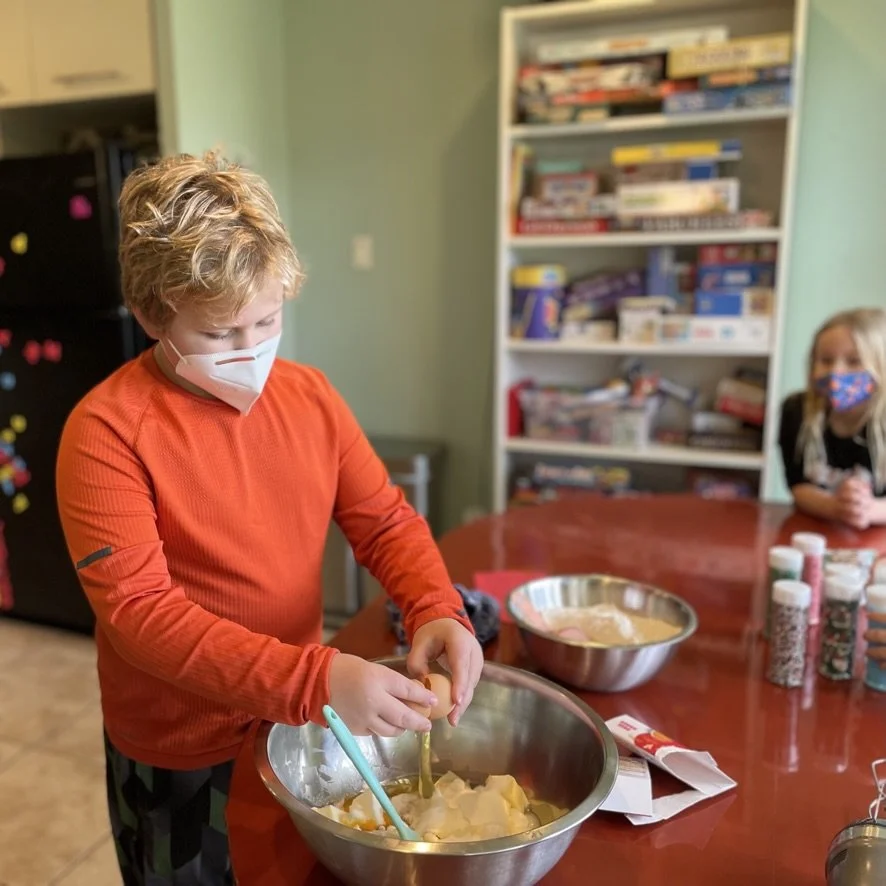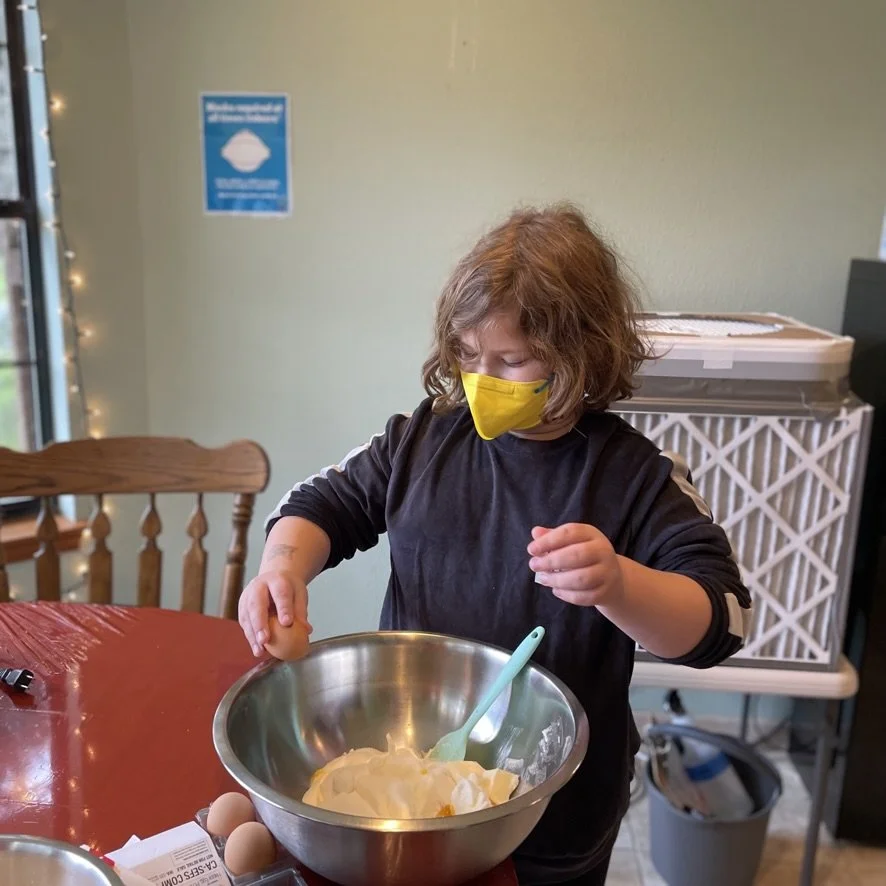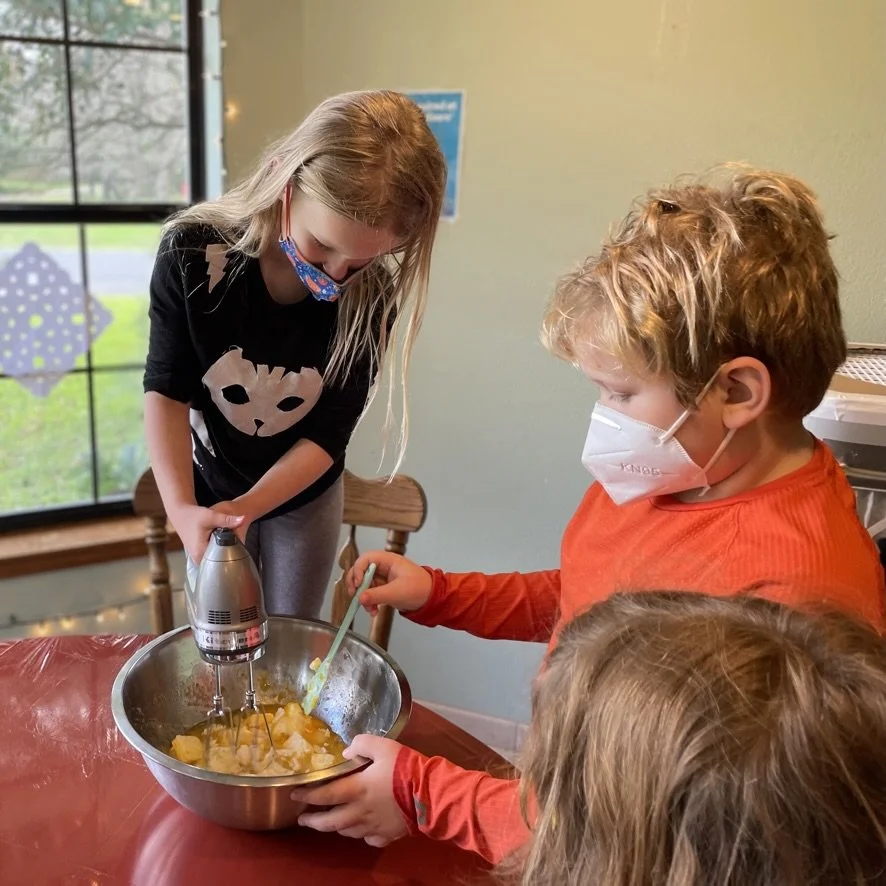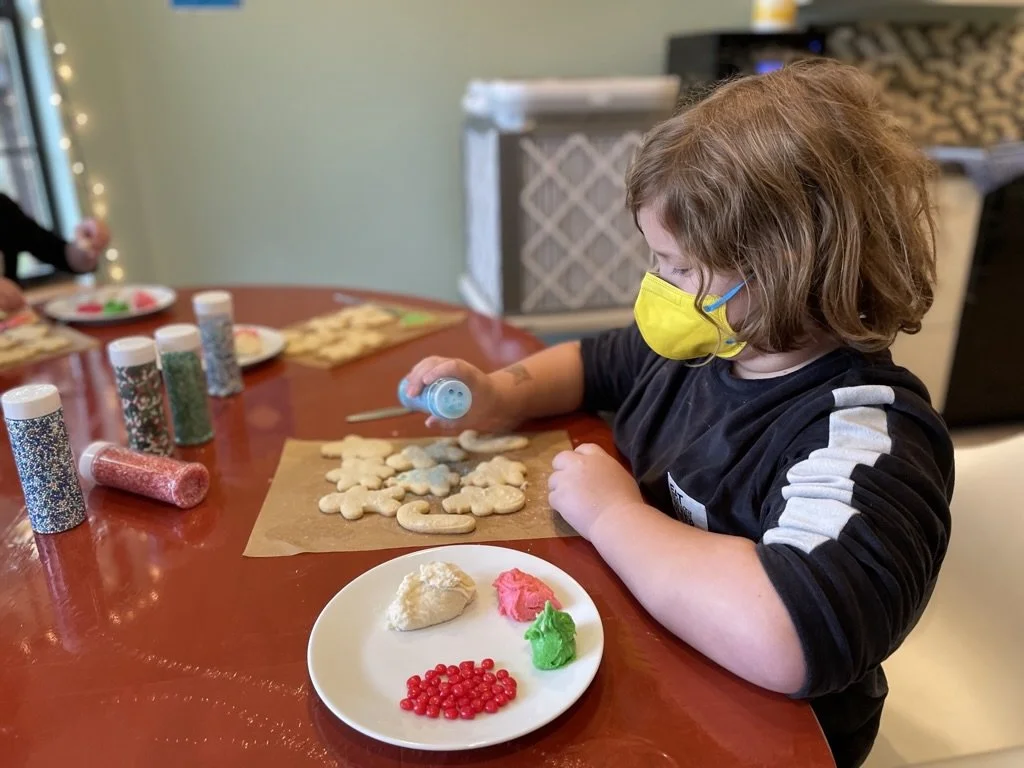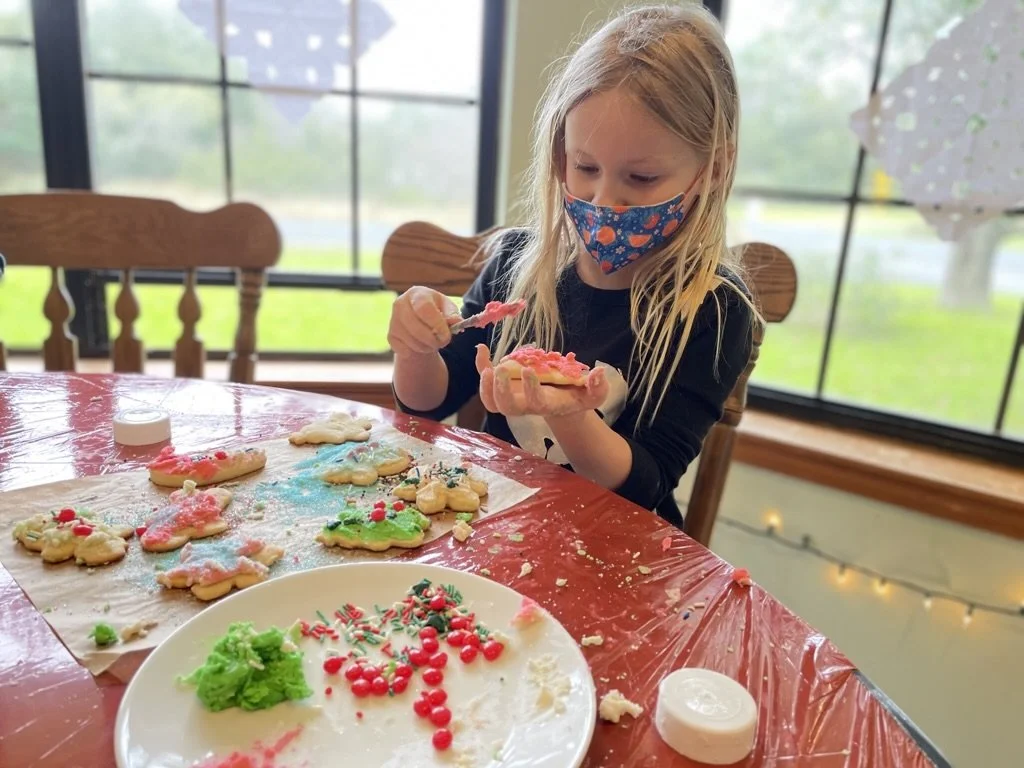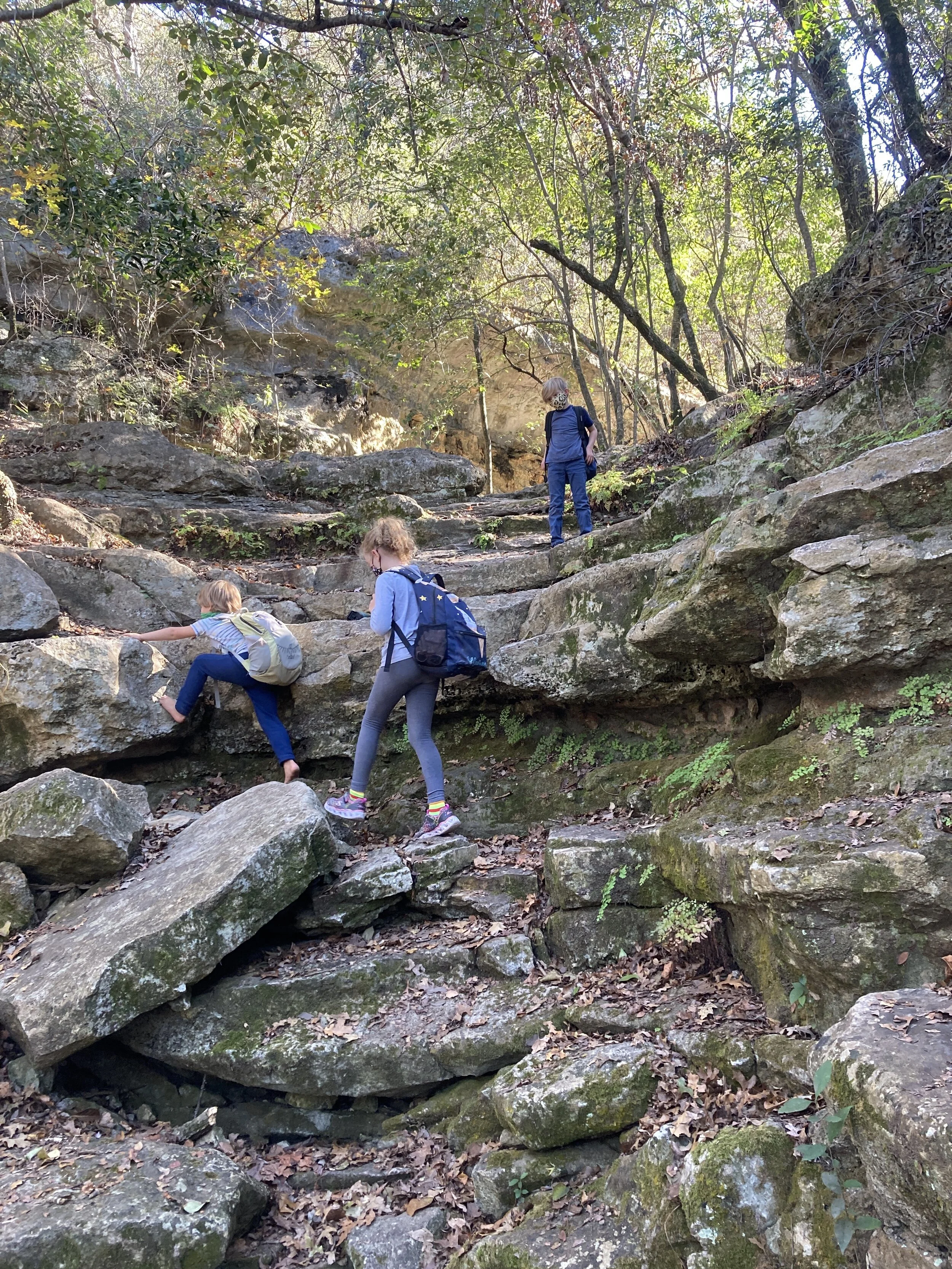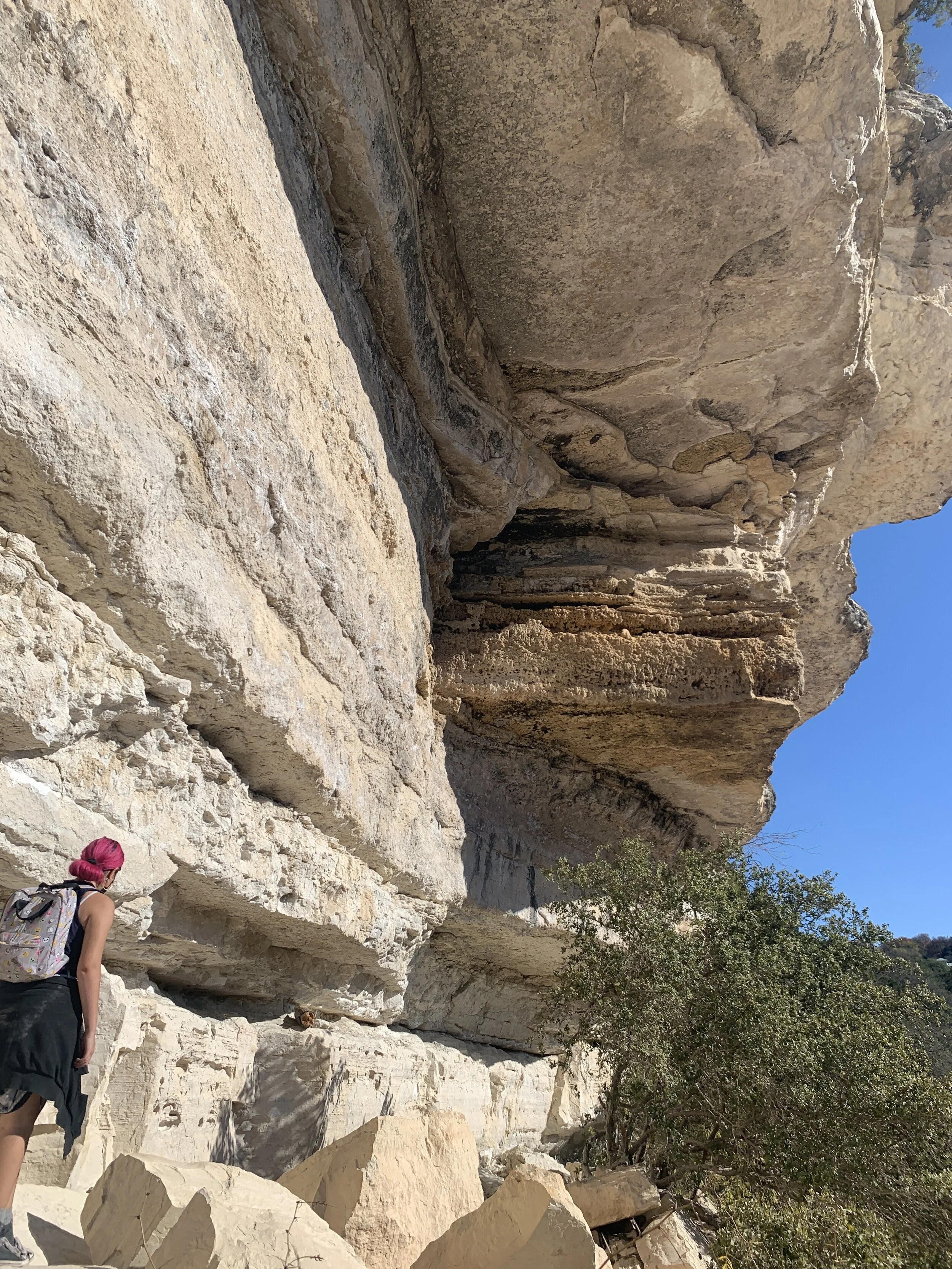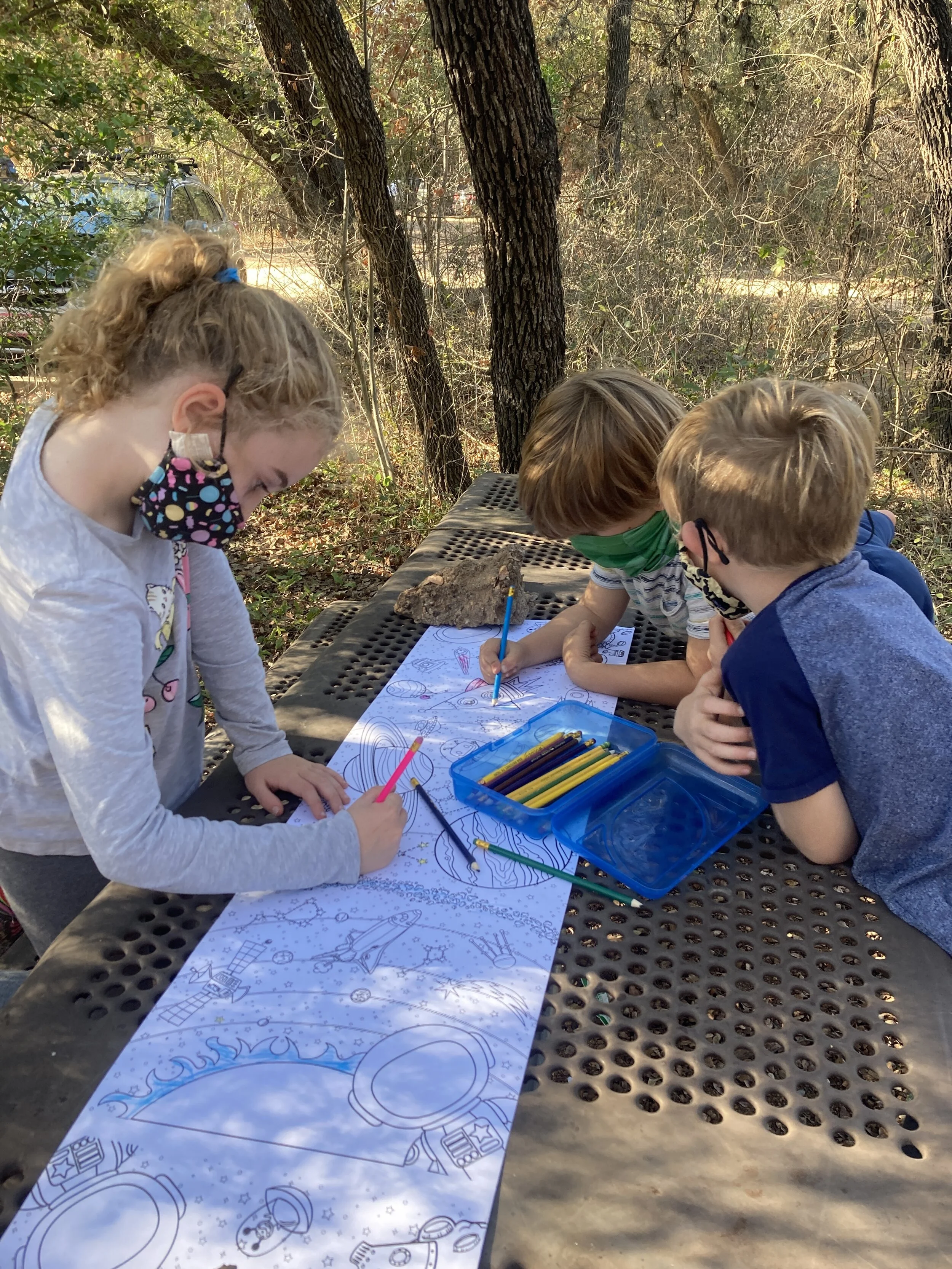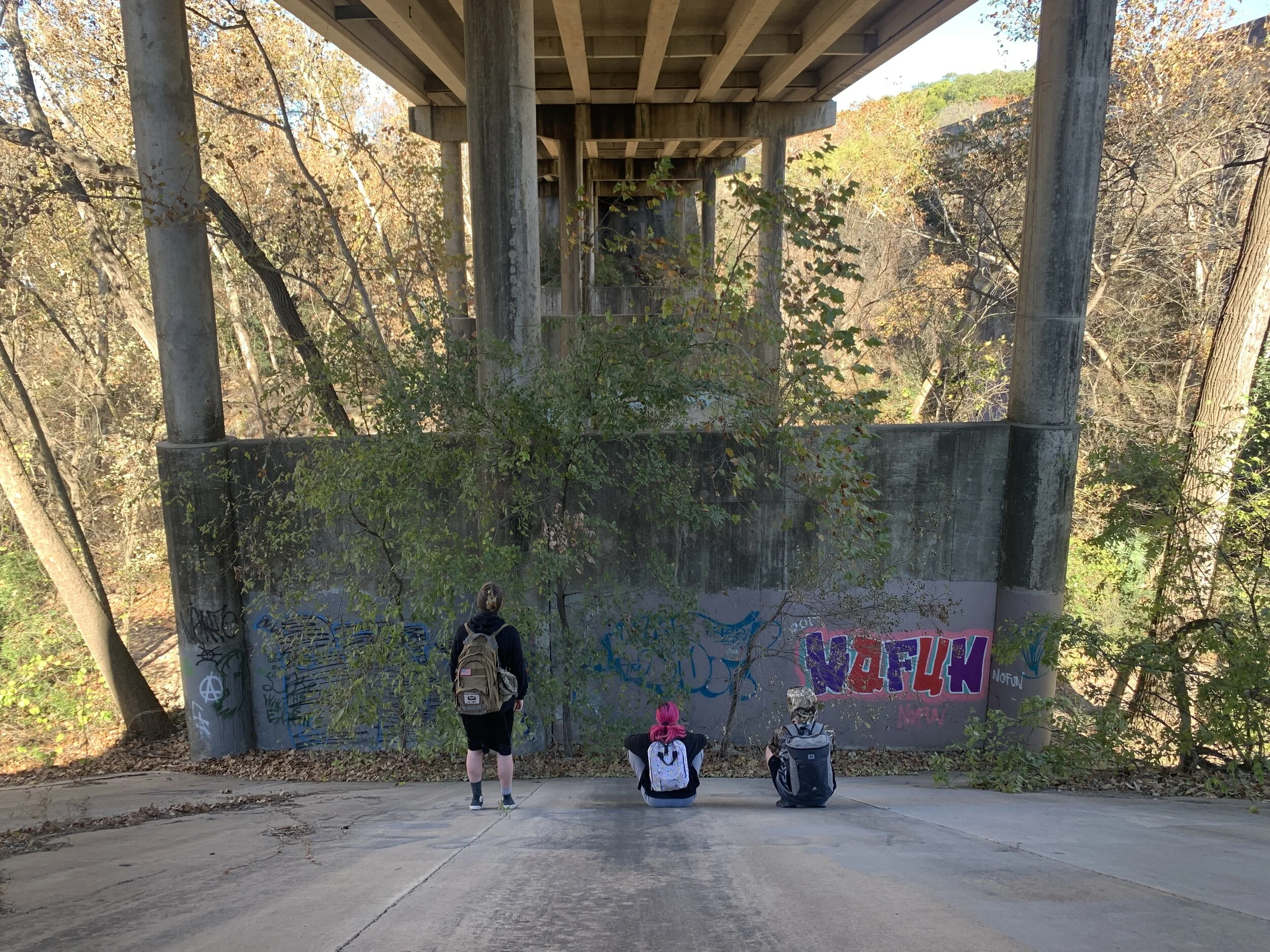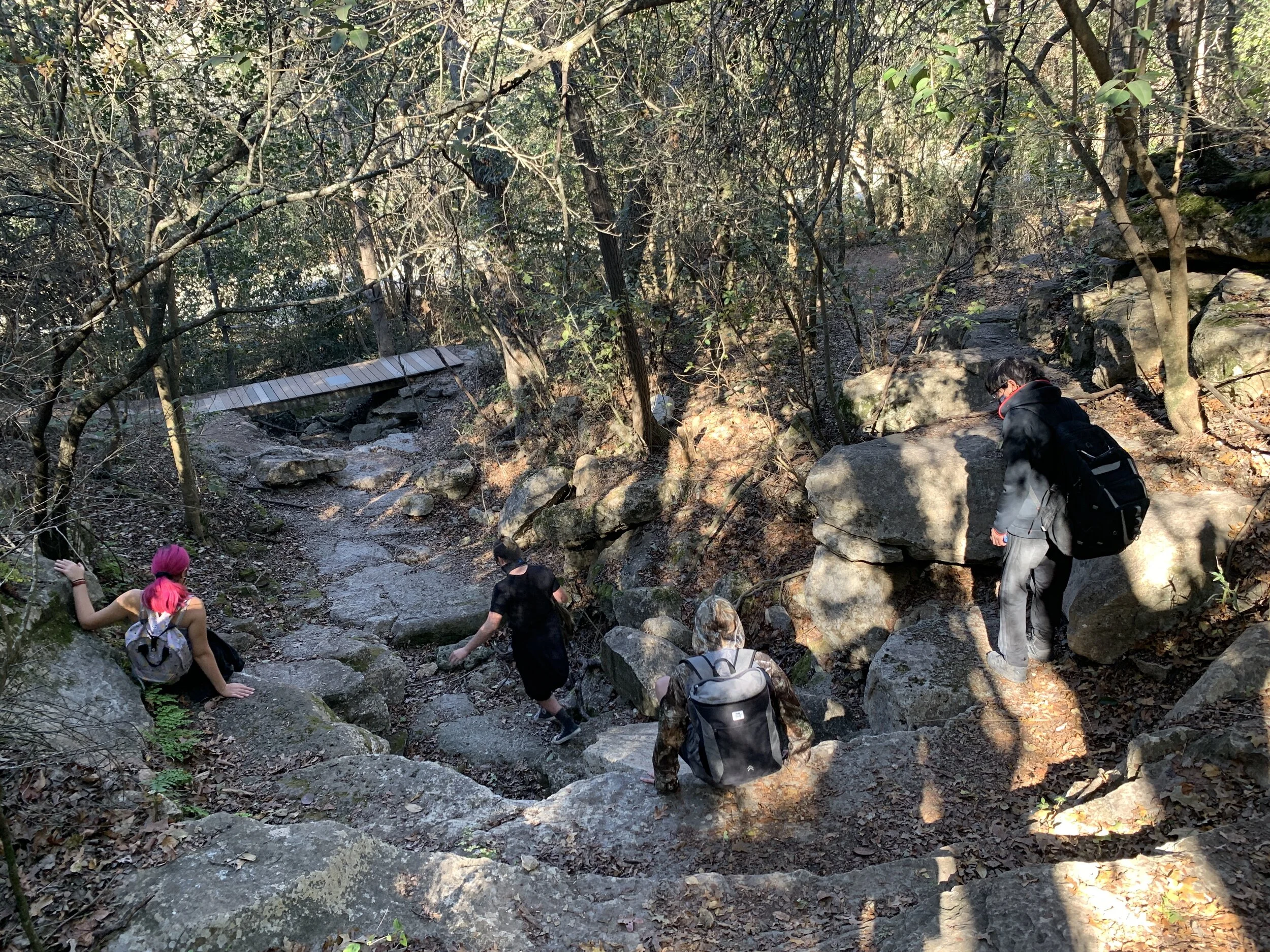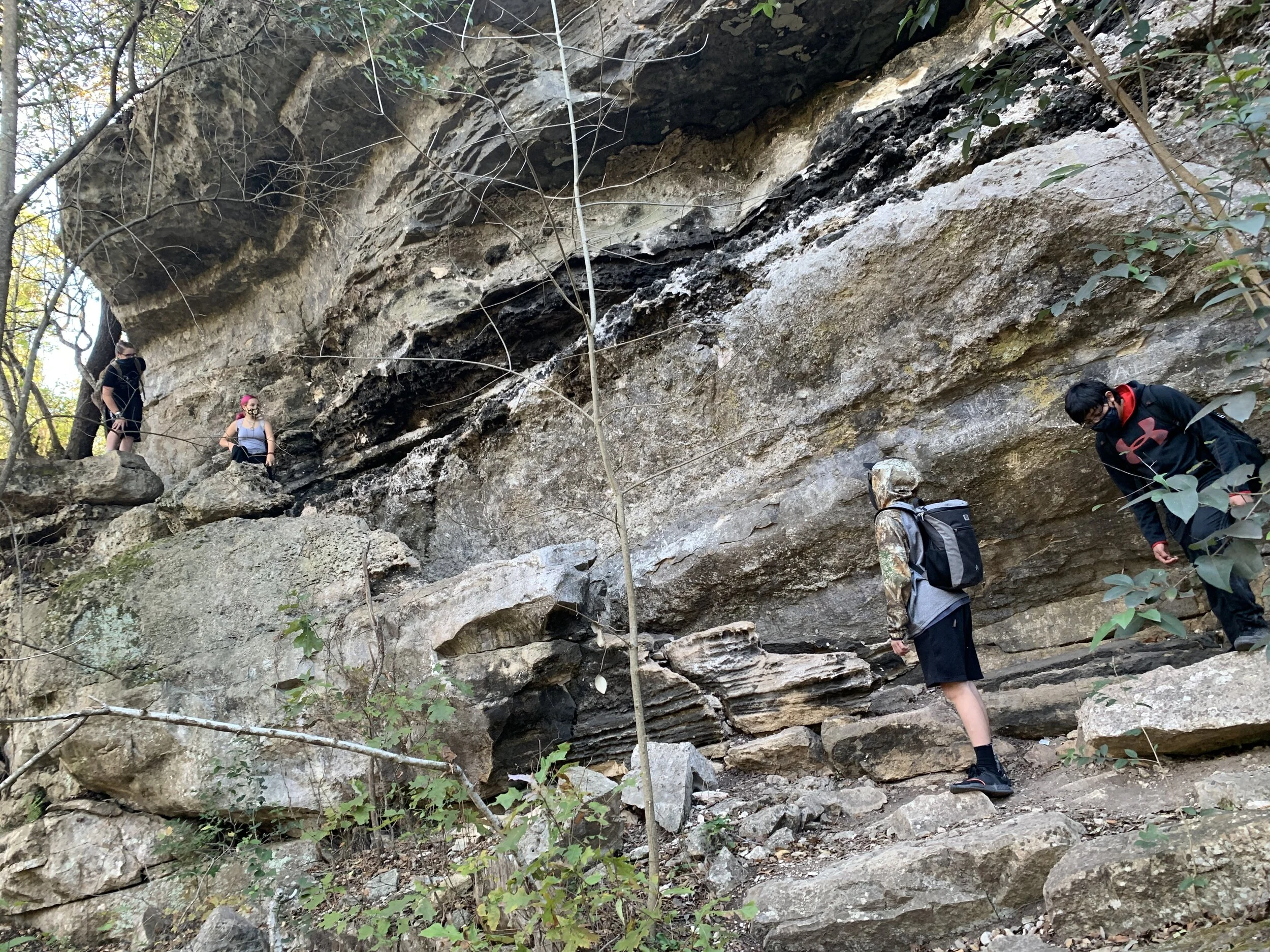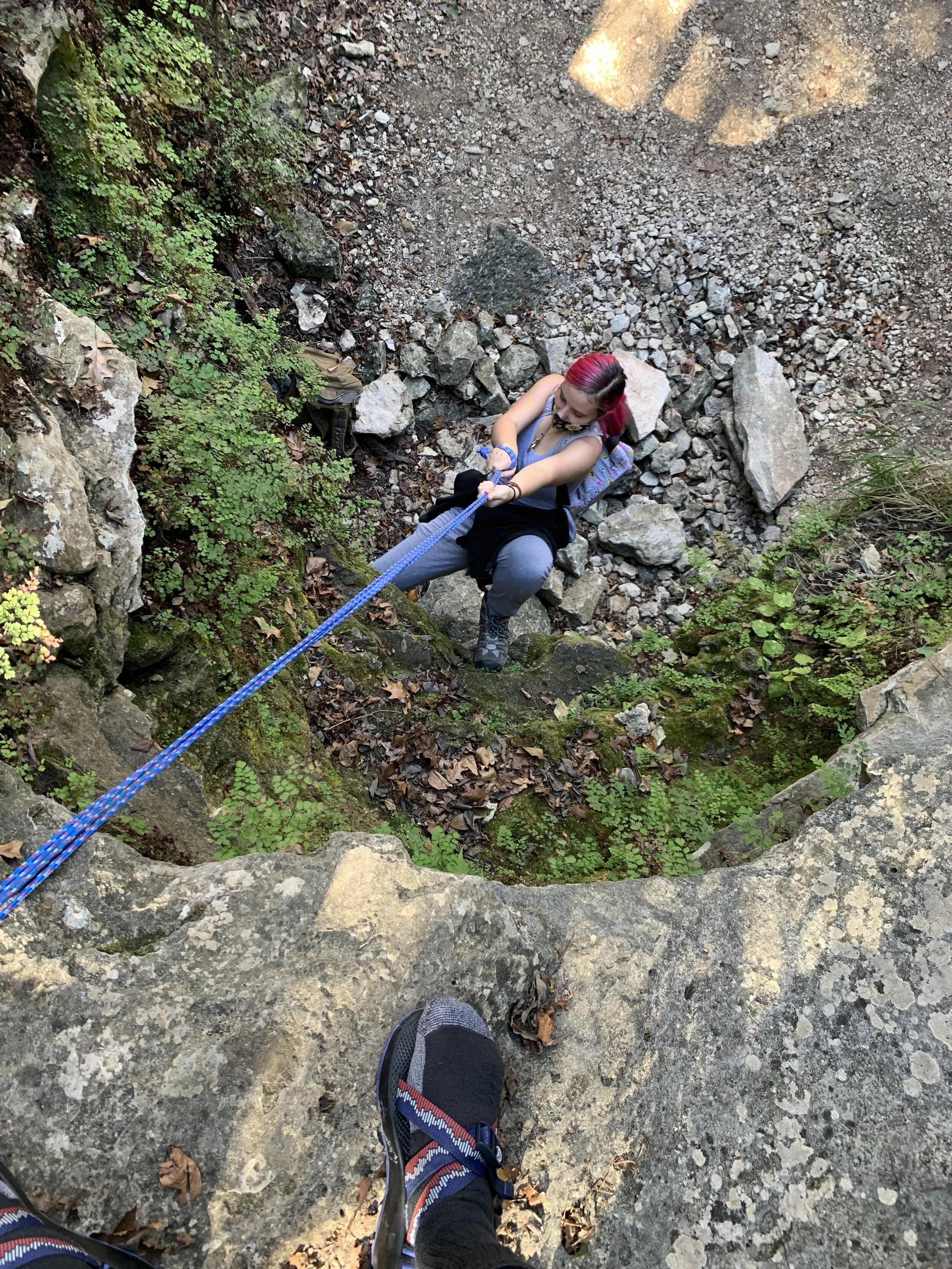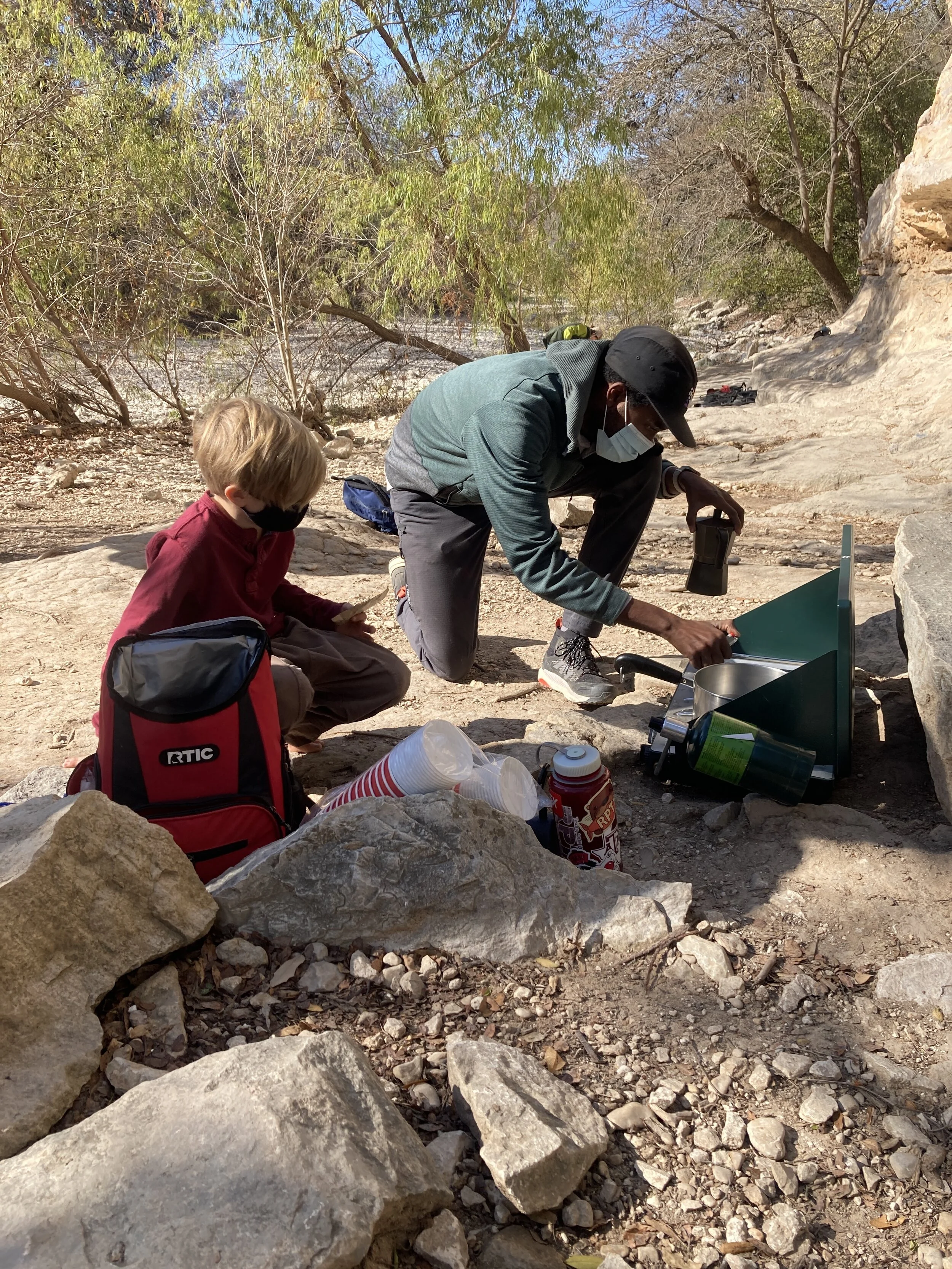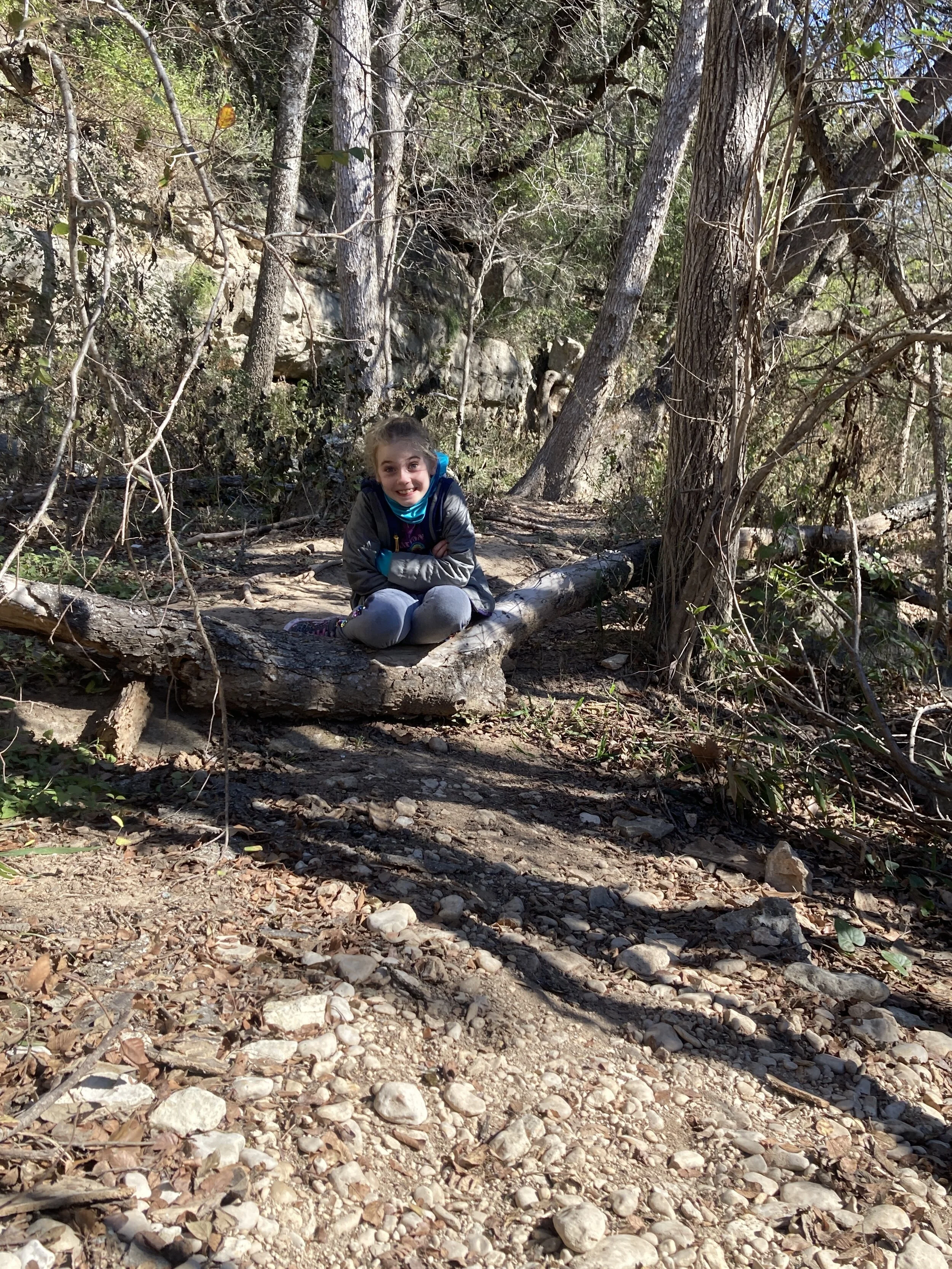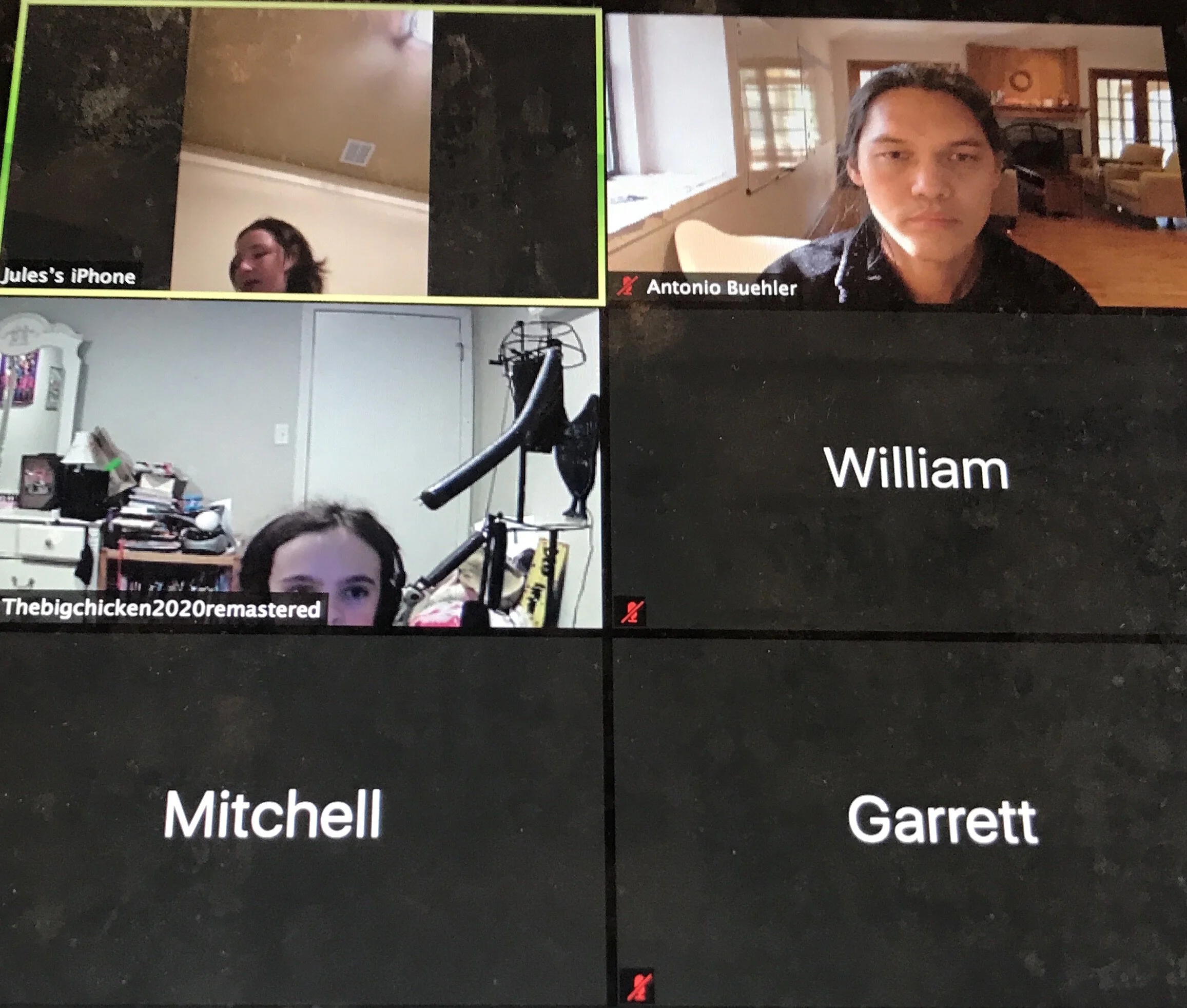The last post talked about the struggle to clean up during and after the making of delectable treats. So on the final day before the holiday, we invited the Abromies into a sugar cookie making offering. But we decided that this offering would need to operate differently.
At breakfast (the name for our morning meeting) we noted that two of the Abromies had plans to open a bakery together someday. So we asked, what is necessary for a bakery to succeed? Yes, excellent baking. What else? Sanitary conditions. Yes. And what was needed to make great creations? Preparation. What else? A clean work area, which means cleaning as we go. And creativity! We decided to set a couple of temporary rules for those who wanted to participate: (1) one needed to participate throughout the entire cookie making process, from prep to final clean up, and (2) we would clean up along the way.
Because of time constraints, before the Abromies arrived that morning we helped out by first covering the table and scrubbing down the countertops. And we organized the ingredients for the cookies and icing mix. Then when it was time to begin, we took down the tape that was blocking entry into the kitchen for everyone to come in. The Abromies were eager to dive in, but we first had to wash our hands. The first of many times.
Then the Abromies went step by step. Steps such as pouring the ingredients into the mixing bowls. Softening butter, breaking eggs, and mixing ingredients. Cleaning the work area. Washing hands. Rolling and cutting the cookies. Cleaning the work area. Washing hands. Baking. Coloring the icing. Washing hands. Decorating the cookies. And cleaning some more. With plenty of breaks in between for taste testing outside.
It was a fun run. Importantly, the Abromies got to experience the joy of baking in a way that took care of other people and that took care of the space. Although cleaning up as we went slowed us down, it made the final experience better. And the Abromies will try to build off of it in their future bake sessions, even those that are impromptu.
A delicious mess
On Monday of last week, two of the younger Abromies who plan to open a bakery together someday decided that they wanted to experiment in the kitchen and make a new kind of dessert. They pulled out many of the standard ingredients such as flour, baking soda, sugar, and vanilla extract. They played around with the ratios based on the available amounts of each ingredient they had, but they felt the real opportunity was in the dessert syrup they could create.
During the excitement of the food making another young person asked if he could also participate. Together, the three of them created a new dish, and quite a mess. When the dessert was finished all the folks at Abrome were invited to taste the results, and the response was overwhelmingly positive. “This is actually really good!” “This is kinda delicious!”
The most challenging part of the day was the cleanup, everyone’s least favorite part. But it is our agreements (e.g., clean up after yourself and participate in end of day cleanup) and principles (e.g., take care of the space) that allow us to have the freedom to express ourselves without unduly burdening others in the community. At the end of the day reflection the question was posed, “what could make cleanup easier?” That question would be revisited later in the week.
Changing the Context
Changing the context
By Antonio Buehler
“Hello, Kenton,” I said to the eleven-year-old seated across from me on the floor. [1] He sat slouched over, avoiding eye contact, staring at the shoe on his extended leg, a seeming warning not to get too close. I asked him why he was interested in joining our education community. He did not have an answer, but he was eager to share that he had “really bad teachers” at his prior school. “No one took the time to listen to me,” he added.[2]
After a long pause I asked him what he likes to think about. “Robots,” he answered, “I had an idea about why robots will take over. Humans can’t contain emotions.” He added that Star Trek was not a perfect human society because “humans have a lot of problems.” When I asked what could lead to an improved society, he raised social justice issues. He was most concerned about police brutality and colonization, and he wanted to learn more about those issues at Abrome.
At Abrome, the Self-Directed Education community I spend my days at, we have limited time to build relationships with young people. We reject the designation of school, just as we reject most of the practices and structures of schooling; but similar to school, we are a place where young people spend six hours a day, for about 180 days a year, for up to 13 years. That is a lot of time, particularly if someone is forced to spend it where they do not want to be, yet it is only about 20 percent of their waking hours in a given year.
Families who seek us out tend to fall into one of two camps. The first consists of those who are running toward us, most often with a focus on finding a liberatory environment where young people can practice freedom on a daily basis. It is with the young people in this camp that we often have the luxury of time, as they tend to stay with the community long-term.
The second consists of those who are running away from something that has deeply harmed their children, although sometimes they are just hoping to stop the compounding violence of schooling that amplifies other forms of trauma. This camp tends to be more focused on emancipation from a harmful institution. In large part, we are seen as a trauma center for families that have run out of options. But we want to do more than just stop the bleeding; we want to assist healing. Too often though, when the bleeding stops, with comfort knowing that the worst is behind them, the family moves on, sometimes reintroducing their kids into the same environments they were running away from in the first place.
Without the certainty or luxury of time, but freed from the constraints of trying to shape young people into some idealized adult vision of what they are to become, we focus on changing the context instead of changing the individual. Changing the context is the quickest and easiest way to support young people no matter the level of distress in their lives.
Opt out
I met Barb and her 15-year-old son, Devin, at the local coffee shop. I introduced myself to Devin, but he just stared at the table in front of him. Barb explained that Devin had recently been hospitalized and needed to find an alternative school as soon as possible because of the harm that school was causing him. I turned and asked Devin if he wanted to leave school. Keeping his head down, he said nothing. I told Barb, “he doesn’t have to go back to school tomorrow.” I explained that finding a new school was secondary in importance to stopping the pain, which she could do by withdrawing him from school immediately. Devin looked up and said, “I would like that.”
Dominant culture believes children cannot be trusted to make their own decisions; if left to their own devices, they will derail their futures. Therefore, by way of parenting and schooling, children must be guided into adulthood. Although the manner of parenting (e.g., authoritative, authoritarian) and schooling (e.g., progressive, classical) that is accepted is not uniform, control over children is the narrative that society has internalized, and it has become so entrenched that opting out seems radical.
Baked within the conventional assumptions of what parenting and schooling should be is a belief that children are not capable of understanding what is in their own best interests. These beliefs are too often the justification for ignoring the cries for help or relief from young people, which ultimately leads many children to completely withdraw from meaningful engagement with their families and the communities around them.
Individually scrutinized, the generalized beliefs around conventional parenting and schooling can be seen as absurd on their face. Does a child need to be able to sit quietly for long periods of time around adults? No. They could be free to play, so long as guardians are not wedded to the belief that children must be docile. Do they need to learn to read by the age of five? No. They could learn to read when they are ready, so long as they are not placed in environments where they are ranked against same-age peers.
But even when we pick apart the individual arguments, people still revert to a general faith in adults wielding power over young people, arguing that we should just tweak or remove the more absurd practices, instead of recognizing that power over is the root absurdity. The first step to changing the context can be acknowledging that conventional parenting and schooling are nothing more than harmful belief systems that have been conditioned within us, and that opting out is a possibility.
A month later, Barb gave me an update. She took my advice and withdrew Devin from school, allowing him to stay home, and she believed it saved her son’s life.
Personal autonomy
Stephanie told me that her autistic child Zachary was in a constant state of distress at school, and that he would bring that distress home to the family each afternoon. Stephanie first tried to advocate for accommodations at the local public school, and when that did not work, she enrolled him in the most progressive school she could find. Yet she still found herself physically prying his fingers from the door frame each morning to go to school, while trying to find ways to ameliorate the compounding symptoms of physical illness that seemed to stem from the stress. Zachary felt trapped in environments where he was expected to contain his emotions, ideas, and movements so that the adults could feel comfortable.
When young people are in distress, adults often attempt to help the child manage through it. This rarely serves to benefit the child as the causes of the distress are usually external. Depending on their identities and places of being, young people can be impacted by the wide variety of social, economic, and legal forms of oppression that adults face. Additionally, other than those who are incarcerated, no group of people are more routinely denied autonomy over their bodies and minds than young people. Autonomy is a basic human need, and distress in response to violations of that autonomy is not a defect of the child. We can change the context for these young people by removing the oppressive practices and structures that are placed upon and inhibit the autonomy of children.
Removing such practices and structures requires self-reflection on the many ways that we as adults police young people for the sake of convenience. Whether we head to work while we send kids to school, or we stay at home and allow children to roam unschooled, we tend to make decisions for them with our own needs or the needs of people other than our children in mind. From an efficiency perspective this can make all the sense in the world. Young people are more impulsive than adults, and are less likely to abide by social norms, especially social norms that prioritize docility in young people. If the goal is to minimize social disruption or move everyone along a similar path (e.g., classroom activities) then tolerance for individual deviations from the group quickly wanes. But what makes sense to those with power in terms of efficiency can lead to terrible outcomes for individuals, with many historical examples of the worst of outcomes when efficiency over autonomy becomes institutionalized and systematized.
A more nuanced debate about the limits of autonomy may be warranted when it comes to culture building within groups. It serves everyone’s interest within a group to be able to feel safe, necessitating that each person consents to being a member, and that there are agreed upon boundaries that each member honors. Boundaries often include expectations of or limitations on ways of being (e.g., noise, eye contact, active participation). The challenge for young people is that they do not get to choose their family, they are often placed in communities against their will, and they typically lack the resources needed to navigate out of spaces that violate their autonomy. Understanding this lack of power, adults must endeavor to strictly limit any encroachments upon personal autonomy to only those that are necessary for the well-being of a consent-based community, or to protect the autonomy of others. We must scrutinize the many generally accepted expectations of or limitations on young people that are not reasonable, such as demands for performance and productive output, controls on movement (e.g., stimming), and notions of respectability. And bodily integrity should be non-negotiable. We must also provide ways for young people to opt out of situations where they perceive their autonomy would be unduly inhibited.
Stephanie’s decision to move Zachary from environments that disregarded his personal autonomy to one that openly acknowledged it resulted in many of Zachary’s struggles quickly disappearing, and the quality of his life and that of his family improving substantially. For example, the tussling each morning at the door disappeared, allowing Zachary and his entire family to avoid a stressful event at the beginning of the day, which helped head off a cascade of follow-on crises.
Acceptance
After our morning meeting on Gabriel’s first day, he asked if he could play video games. I said, “yes, you get to decide how you spend your time here.” Thirty minutes later I was walking through the space and I noticed a cable running from an outlet into a closet. I knocked on the door and heard, “come in.” I opened the door and saw 14-year-old Gabriel on his knees playing on a laptop. I asked if everything was alright, and he said it was. I asked if he wanted to interact with others, and he said he preferred remaining in the closet. He stayed there until the end of the day.
Gabriel’s routine continued day after day. The other Facilitators and I became more and more concerned that perhaps we were not properly supporting someone who chose to wall himself off in a closet for the entire day, each day. Our schoolish lens had us worried about missed opportunities for development, as well as possible questions from his mom about how he was spending his time. We chose to push down our insecurities, prioritize being welcoming and inviting, and honor his desire to be by himself.
We live in a society predicated on hierarchy. We judge others (and ourselves) by where they fall within various hierarchies. And where they fall determines to a large degree what access, privileges, and so-called rights they have. The pyramid structure of society requires large numbers to fill out the base so that a select few can benefit from their place near the apex. In other words, most people have to be labeled as losers in order to justify the outsized gains of the winners in an ostensibly meritocratic society. We see these hierarchies in most all economic, legal, political, and social institutions. These hierarchies not only determine who benefits and who exist to serve those who benefit, they also perpetuate and reinforce the unjustness of other existent hierarchies (e.g., white supremacy, ableism).
Young people are not immune from the impacts of hierarchy. In fact, hierarchy is a primary force in shaping them. As an oppressed group with negligible economic and political power, they are seen by government and industry as raw material to be molded into reliable workers and consumers (the base), while their family often encourages a climb to the top. Because the aforementioned groups are constantly measuring the youth (e.g., grades, athletic performance, leadership positions) in an attempt to rank and sort them, young people learn quickly how they measure up to their same-aged peers.
Unfortunately, the cloud of competition leads to a denial of self, as ways of being become scrutinized and used as inputs for placement within hierarchies. While families with sufficient material resources may find ways around it, children who are considered too far below or behind arbitrary behavioral or performance norms are often singled out and treated as defective. Children whose identities are not idealized by dominant society (e.g., Black, Indigenous, trans, undocumented, autistic) risk amplified marginalization.
Because of the unforgiving nature of the pyramid structure of society, young people must expend significant energy masking their emotions to ward off scrutiny from adults in positions of power. This harms young people in the moment and in the future, as it forces them to ignore their most basic needs, denies them meaningful relationships, and hinders their natural development. Adults can change the context by accepting the child for who they are and their ways of being. Acceptance allows for the emergence of psychologically safe spaces where children are free from assessment, judgment, or ridicule. Instead of declaring what is important and then measuring it, adults can trust kids to take what they need.
The closet door in many ways was a physical boundary that Gabriel used to protect his emotional boundaries. And for perhaps the first time in his life, Gabriel’s boundaries were honored. Like many young people who have been wounded both in school and in their personal lives, Gabriel did not need to be pushed into activities or behavior that made adults feel comfortable—he needed to be accepted for who he was in the moment, and to have his needs centered. After a month, Gabriel left the closet for good, and fully embedded himself at the heart of the community.
Question authority
During one of our twice-weekly Flying Squad days, we stopped by the Texas State Capitol. Flying Squads is an intentional effort to support young people in reoccupying public space in an anti-child society. The young people I was with chose to explore the grounds, and 20 minutes later Kenton and Harriet came back to tell me that they had been kicked out of the Visitors Center. I asked why and they said because they were without a chaperone.
Children are oppressed in contemporary society in part because many ostensibly well-intentioned adults believe oppressive practices are necessary to prepare children for an unfair world. This is shortsighted on two accounts. First, oppressing children doesn’t better prepare them for future oppression. Abuse wears people down, forcing them to expend limited personal resources trying to minimize, resist, or escape it. Second, oppressing children seeds future oppression. It is easier for people who have internalized the oppression of one group (i.e., children) to rationalize harming others (e.g., the houseless, BIPOC) or supporting institutions that do (e.g., capitalism, white supremacy). And simply having been oppressed in the past is not automatically some form of inoculation against being willing to accept the oppression of others, particularly when people get to graduate into the class of the oppressor (i.e., adulthood). Adults can instead engage in the struggle of youth liberation.
Youth liberation compels us to change how we interact with kids. But it also requires that we go further by using our relative privilege to alter the ways that other people and institutions interact with young people. One of the most powerful methods of doing so is to question authority. We must start by critically examining whether forms of authority are ethical, the ways in which authority is established (or imposed), and how authority is perpetuated. Then, we need to identify ways to subversively challenge that authority.
When we interrupt child oppression, young people see that we stand in solidarity with them. We change the context. We let them know that just because we are free from the age-based discrimination they face does not mean we do not concern ourselves with their struggle. We let them know that their experiences and their lives matter to us. And that recognition can open up conversations about how liberation is intertwined, how none of us are free until all of us are free, and how we can support the liberation of others. In this way we not only stand up for them, and children everywhere, we seed in them the capacity to stand up for others.
When I walked into the Visitors Center with the young people in tow, a member of the staff and a security guard met me at the main desk. I asked why they kicked the young people out of the center. With the young people listening intently, I wanted to model how we can question authority. The staff member said they were worried about kids being in the building without an adult. I told them that we believe that young people have as much of a right to navigate public space as adults do.
Their supervisor then joined us at the desk and stated that it was policy that children have a chaperone with them. When I asked to view their policies, she told me that it was not written down as a policy, but it was instead a commonly enforced practice. I pointed out that since it was not a policy, that they did not have any right to restrict these kids from being able to roam unaccompanied through the center. The supervisor then asked who would be held liable if the kids injured themselves or damaged something. I said I would be. I then turned toward the young people and told them to enjoy themselves. Kenton's eyes met mine while I was saying it, and he smiled. Then Makayla, recognizing that everyone was still standing around, said, “alrighty,” and off they ran.
Place within society
I looked out the window and saw Kenton, Leo, and Raj about 50 yards away playing in the grass. Then I saw seven-year-old Leo, who was visiting as a prospective member of the community, throw a large rock into the road. I walked outside to have Leo remove the rock from the road and to bring everyone back to Abrome. I then turned to Kenton, who was a few years older than the others, and said, “we need to take care of each other.” He replied, “I’m not a babysitter.”
I asked Kenton, who had only been with us for a couple of months, if he felt he had any obligations to others. Kenton changed the topic and said that he was upset because this was supposed to be an “activist school” and that he did not feel as though we were doing enough in the community. I responded that we were trying to create something that went beyond protesting or getting arrested. I explained that we were trying to live prefiguratively, meaning we were trying to organize and engage with each other in ways that not only allowed us to navigate and improve the society we live in, but to model the relations that a better future society would entail.
Why should young people believe that this world is for them? They cannot vote even though the consequences of political decisions will most often impact them more than any other age group, as they are the ones stuck with laws and policies the longest (because older generations die off). In sick societies that value wealth accumulation over collective well-being, this leaves younger and future generations with the burden of reckoning with legacies of human rights violations, dispossession, poverty, and environmental degradation.
Young people also have limited control over their own bodies. Thanks to compulsory schooling laws, kids are situated in environments where they are forced to compete against peers on measures that often have no meaning to them, and subjected to punitive rules that regulate everything from what they can wear to when they can talk. The lack of bodily autonomy also extends beyond the schoolhouse. They are age-limited on employment options, and the number of hours they can work “when school is in session.” At home, even in cases where young people are being abused, states prohibit children from emancipating themselves until their mid- to late-teens, and then only if they are self-supporting, which is an impossibility for most because of the restrictions placed on youth employment. And even in the most supportive of homes, kids are unable to access certain types of healthcare (e.g., birth control, vaccines) without the permission of their parents or guardians.
While youth liberation can seem like a fantastic delusion at times, particularly from the point of view of young people, we can help them reconceive their place within society, and support them in acting on society, so that they can take ownership of changing the context of their lives and of the world around them. We may not be able to liberate them by ourselves, but it can be liberating for them to realize that we trust them to not only make decisions about how they spend their time and what their education looks like, but also to engage with the world in order to alter it. Being able to live what we want to create in the world can be the most liberating feeling of all.
Two weeks later, we dedicated our tri-weekly field trip day to supporting the houseless community, spurred primarily by a vicious public backlash by rightwing groups to the Austin City Council decriminalizing houselessness. The decision was a personal one for one of the kids, who had been houseless the year prior. We made hundreds of lunches and a large pot of soup, and went to three houseless encampments in the city to distribute the food. Many of the young people got into extended conversations with the houseless folks, particularly Kenton, Harriet, and Olivia. The experience allowed them to feel as though they could take action to materially improve the lives of people beyond themselves.
Moving on
Kenton had joined us in the fall of 2019, hoping to put an end to a string of bad schooling experiences. While I was shocked by how he had been treated at his prior schools, it was learning about the trauma he faced in his personal life that really floored me. That trauma helped explain many of his initial difficulties: defensiveness, angry outbursts, an unwillingness to trust others, and dissociation when stressed. But, by changing the context in all the ways mentioned in this essay, over the span of about half a year, he slowly learned to trust us, trust in himself, and trust that he could improve the world around him. Unfortunately, once the pandemic hit in 2020, he had to move out of state to be closer to family.
Changing the context has an outsized (arguably the greatest) impact on the quality and direction of the lives young people. Parents and guardians have about 18 years to support children, while caregivers and educators have far less time. While we can lament the years children may have needlessly suffered through the expectations and limitations of dominant society, today will always be the best day to change the context.
[1] This essay is a work of nonfiction. Names, genders, and some descriptive details have been altered to protect the privacy of individuals.
[2] This essay was originally published in the book Trust Kids! Stories on Youth Autonomy and Confronting Adult Supremacy, edited by carla joy bergman, AK Press (November 2022).
Are my kids ruining their lives choosing trade school over college?
I received an email from a parent I did not know expressing fear over their kids opting out of college to pursue trade careers. This parent has two master’s degrees and their partner graduated from one of the top three law schools in the country. They value higher education and they chose one of the “best” (most affluent) public schools in the state to put their kids on the right path. The final paragraph of their letter read:
I am reaching out to you because I struggle with my fears regarding their choices. I viewed a couple videos posted by you, and I hoped that you might have some other resources for me. I am really afraid that they are ruining their futures by choosing trade school over college.
Below I share my response, with minor modifications to remove select identifying information or extraneous text.
There are many articles and analyses that highlight the benefits of seeking to develop trade skills over a college degree, and on the other side there are many articles and analyses that argue that a college degree is good investment in terms of lifetime earnings. People could throw those at you all day long and I don’t think that either would be able to address your anxieties.
At the end of the day there are countless unemployed and underemployed college graduates who have nothing to show for their four (or more) years at college. It didn’t help them get a better job and many are working jobs they could have easily gotten without the degrees (e.g., B.A.rtenders and B.A.ristas). That doesn’t necessarily prove that the college degree is not worth it, it just highlights that it is not worth it for many.
One of the big problems with most of the articles and analyses is that they look at large datasets and report generalized numbers that do not translate well into individual outcomes.
Generally, the more selective the university the higher the lifetime earnings. Generally, the more technical the degree the more employable and the higher starting salary out of the gate. Generally if one graduates from college they make more in their lifetime than if one does not. Generally.
For certain career fields certain degrees and certain university names matter. As your husband probably knows well, if one wants to be a SCOTUS clerk it really really helps to go to Yale, Harvard, or Stanford Law School. And if you don’t go to one of the top 14 law schools it is much harder to get a clerkship. And if one wanted to get into a select one or two private equity funds out of college they should go to Harvard or Wharton for undergrad. But these are very select examples. For most people and most career pathways it really does not matter much.
Another complication with all of those articles is that they do not often focus on the resources of the family. Many of the jobs people receive have more to do with family connections than university or degree. And lifetime opportunities often have more to do with connections (family or community) than anything a college provides. It often ignores that lower middle class families and students have to take on large amounts of debt, but affluent families foot the bill for their kids and they get to leave college free of debt. But all of that is so rarely discussed in the analysis of college. What is shocking when first seen however is how rich white kids with no college degree often do better than students of color with college degrees in terms of lifetime earnings. It’s a really complicated issue that touches upon race and class and society.
Also, it really depends what the person wants to do and how hard they may be willing to work for others to get what they want. Being able to work within large or powerful systems for a career can provide tremendous financial benefits (think working up to Partner at a top tier corporate law firm or investment bank). But of course the sacrifices to do that are great and the competition is fierce. It really is up to each person to decide for themselves if the effort is worth it.
As you’ve probably heard me say in the past, what matters most is leading a meaningful life. For me a meaningful life trumps financial security. Of course a meaningful life plus financial security trumps a meaningful life and poverty, but a college degree does not really guarantee a meaningful life or a financial security. What I know for most everyone is that a meaningful life is most often found when one has the autonomy to pursue what interests them, when they have the support of those they care about, and when they can build community with others. And that there are countless miserable people with college degrees that squandered their college years checking a box because they were told they needed to get a degree to be successful.
I don’t know your children’s personal goals or what brings them joy and meaning in life, but I would recommend that you support their chosen path and let go of trying to convince them not to throw away their futures. Someone who works in a trade and has a strong understanding of personal finance and lives within their means can easily do better than most of their peers that went to college just because it was what they thought was a good financial investment. Your children will likely never be able to charge $1000 per hour but most of the trappings of upper middle class success don’t bring happiness, and often just lock people into a high cost of living that necessitates continued work for the sake of affording that lifestyle. The last thing I’d say is that if you want to be able to influence your children moving forward you may want to reserve that for the more significant challenges of life such as how to deal with loss, how to navigate relationships, and how to raise healthy children. If the feeling they get from you is disappointment in their life choices then they may choose to simply stop engaging with you about their inner lives. Even if you could convince them to go to college and perform and then go into certain career fields and perform would it be worth it if they don’t let you in as they deal with the most personal matters?
It’s natural to feel anxiety in our schooled society. But many of the arguments of society surrounding school are without context or simply wrong. The question, I think, is how can you best support your children as they lead their own lives moving forward? In order to answer that question honestly you may have to let go of your own view of what success for them looks like and allow them to answer that for themselves.
I hope that by sharing my response here, that someone may find the words that they need to support their children in living their most meaningful life.
——
Image: Photo by Jeswin Thomas on Unsplash
Day 55 of AY20-21: the bad business decision of being safe during Covid-19
What do you call a day where everyone shows up for remote meetings, but only three Learners show up in-person? You can call it day 55.
This fourth cycle of the pandacademic year has thrown us a few curveballs. It was the first cycle that we had to make one cell remote because we entered into risk stage level four in our county. It was the first cycle without Facilitator Jennifer, and with Facilitator Ariel. It was the first cycle that a Facilitator (Antonio) was fully remote, meaning that Facilitator Lauren would be helping to train up Facilitator Ariel. It was also the first cycle that we had to make some difficult calls about who needed to be remote for the cycle. Surprisingly to us, it was the first cycle we had shadowers join us (three of them!). And it was the first cycle where we moved away from the green spaces that we had been getting used to since September. We have done our best to remain agile and flexible as we’ve gone outdoors in small, physically distant cells of no more than 9 people each.
Everyone showed up for the remote morning meeting! It was the first time that they all showed up to a meeting since one of the Learners was forced to move from the in-person cell to the remote cell. Meanwhile, in the in-person cell, one Learner couldn’t make it because they did not have a ride, and another Learner took a personal day. Coupled with no shadowing prospective Learner and having had one Learner go remote, on top of starting with a smaller cell than the remote cell from the very beginning of the cycle, the in-person cell seemed tiny for the day. Not that the three young Learners who showed up were complaining, as they had the full attention of two Facilitators.
After the remote morning meeting, one of the Learners stuck around to talk to me on Zoom. He is always interested in the business aspects of things so he asked about Abrome’s strength as a going concern. As we talked about the challenges that the pandemic has posed to our community, he stated that he does not want Abrome to close. While I know that he cares about Abrome, I was surprised to hear him say it so plainly. This particular Learner, who has been with us since the day we opened in the fall of 2016, has had some rough moments at Abrome, more so than all the other current Learners combined, and he has said more than once in moments of frustration that he does not want to come back to Abrome. We have had some really challenging moments discussing how to maximize autonomy within a community, and have had long conversations around topics such as consensus decision-making, honoring commitments, and nonviolent communication.
I told him that I did not want Abrome to close either, and that after losing a couple of Learners that we were now growing, ever so slowly. I told him that this pandemic has parents scared about the future and that many are clinging even harder to the false notion of schooling as a safety net that will at the very least not allow their children to fall down the economic ladder from where they are at now. But despite that, that a tiny percentage of families would appreciate our approach to community care in the face of pandemic. That they would want to be a part of an education community that was willing to make bad business decisions such as going outdoors in small groups for the year, as opposed to the schools who chose the more profitable business decision of bringing everyone indoors so they can absorb families who are fed up with virtual schooling or requirements for kids to wear masks in class. And that this was a continuation of us having always made bad business decisions such as allowing kids to practice freedom, refusing to force them to do math or language arts each day, or forcing them to perform for parents once every six weeks. Because sometimes good business decisions are really harmful to kids and families.
I then asked him why exactly it was that he did not want Abrome to close. He told me it is because everyone is nice and he gets to play computer games. And that was a good enough answer for me.
Investigating the golden ant colony they found
The in-person cell was having a blast that day. They chose not to hike so they could recover from all the physical exercise over the prior four days. They stayed at what they call the Rock Wall and made hot chocolate. One Learner forgot his water bottle that morning, so he left for the second half of the day, leaving them with a 1:1 Learner-to-Facilitator ratio! They found some fascinating golden colored ants that took there attention for quite some time. They also had a conversation about what they would do if there was lightning in the area, as the forecast suddenly shifted to the possibility of thunderstorms over the next hour. Fortunately the weather was perfect that afternoon.
The remote cell found no cool golden ants, but we did do a free write that afternoon where a Learner showed up and shared the hour with me. That same Learner later led the afternoon meeting. Her prompt for the meeting was asking the other Learners about their intentions for the weekend. She then adjourned the meeting, and I got back to work trying to find ways to allow parents to trust that they can allow their children to practice freedom. It may not be the best business decision in terms of growing enrollment, but it is good for the soul.
Lots of interesting finds on this Friday
Day 54 of AY20-21: getting lost and finding our way
On Thursday I led the morning meeting with the remote cell with the question, “what are your goal-oriented intentions today?” I asked this because when we set intentions they tend to be more goals than intentions. Afterward, I asked them what their non-goal intentions, hence, what are your intentions. Interestingly, they were all relatively similar: vibe, find peace with today, slow down to avoid stress, stay calm, stay calm, and stay calm.
Exploring and climbing
After the morning meeting a Learner who just moved to remote because of a needed quarantine stuck around to chat. We had a nice, long conversation that centered on the recent loss of a family member. He talked about why the person was so important to him, and then we let the conversation meander. The conversation lasted nearly an hour, and when we signed off I realized that I had had another Learner waiting to have a conversation with me on Discord for 25 minutes! I apologized for completely losing track of time and we then settled into a nice 24 minute conversation.
Getting lost was half the fun
At the in-person cell there were three younger Learners, one adolescent Learner, and Facilitators Ariel and Lauren. While the Learner is wonderfully able to communicate with and support younger Learners, she understandably also enjoys being around Learners who are around her age, as well. The 13-year-old prospective Learner finished his shadow on Tuesday. One 16-year-old Learner was forced to go remote because he needed to quarantine because a family member just flew in from another state for support after the recent death in their family. And the other 16-year-old Learner was carpooling with the Learner who needed to go remote, so he is only able to attend twice a week for the rest of the cycle. This is one of the challenges of sticking to our Covid-19 protocols while the rest of society seems to be throwing their hands in the air—sometimes our small cells become even smaller.
The Facilitators had expected the present adolescent Learner to work on an artistic project that day, and one of the Facilitators had planned to support her in finding and protecting a solitary space to do that. But that morning she announced that her goal was to instead go to the urban assault wall. It is a place that the Learners had spoken of wanting to visit multiple times this cycle, but one that they had yet to find. She asked Facilitator Ariel if he would accompany her on the trek, and Ariel agreed to but let her take the lead. And off they went.
Facilitator Lauren hung back with the three younger Learners, ages six, eight, and eight. The crew decided that they wanted to go to The Bridge, but the noise that day was uniquely challenging for two of the Learners. They informed Lauren and the other Learner that they wanted to move away from the noise and so they hiked on. Their hike was not exceedingly difficult, but it is still good exercise, and they have been working their bodies more at this location than at any of the other locations we have been at this year. They eventually stumbled upon a cool limestone bowl where they decided to settle down so they could enjoy the aesthetic of the spot. One of the younger Learners took out a book he had been carrying around in his backpack and the other Learner read it. The Learner who had been carrying it around then narrated some stories, as well.
What a hike. What a view.
The adolescent Learner and Facilitator Ariel were not finding the urban assault wall that they were looking for. Ariel decided to show the Learner a map of the area, and told her that they seemed off course. The Learner was insistent on moving forward, and they eventually found themselves behind a large grocery store which made clear where they were. They went 2.7 miles in the wrong direction. The decided to find a place to sit down and think through how they could reorient themselves and get moving in the right direction. The Learner identified a way back to The Cave, and then Ariel gave his suggestions on how to get to the urban assault wall.
Community coloring at the end of the day
The route they took was scenic and eventually led to the urban assault wall! Ariel had long conversations with the Learner, and she admitted that she was not initially looking forward to the day because the other three older Learners were not going to be there, but that she was happy with how the day was turning out out. They then got into a conversation about liberation, with the Learner explaining why it is important to her. They also talked about field trips that Abrome has taken in non-pandemic times, and hopes for what future cells can do during this pandemic.
At the pickup spot they found Facilitator Lauren with the younger Learners coloring a large rollout coloring sheet. During that crew’s hike, two of the younger Learners fell at different points in the day, but both recovered well. As the Facilitators and the older Learner discussed the challenging hikes they had that day, Facilitator Ariel checked his health app and noted that they had walked over 5.7 miles and climbed over 30 stories in elevation! It seemed that getting lost was just as important as finding their way.
Day 51 of AY20-21: risk and trust
I started my Monday morning frantically working to finish a blog post on why all schools should close their doors for the rest of the winter. I was hurried in the morning and ultimately was not able to get it finished. But I made great progress and I felt that I had prepared myself for a great day. Plus, I figured I would be able to squeeze in some time to finish it up in the middle of the day. At 9:30 a.m., Facilitators Ariel and Lauren called me to check in for the week. We had a quick ten minute call to talk about what we hoped to accomplish during the week and what we would each focus on. And then at 10:00 a.m, I jumped onto a zoom call for the morning meeting with the remote Learners.
Two of the Learners were missing for the morning call so the meeting was going to likely be a shorter one. I wanted to get the Learners to be thoughtful about their contributions during the meeting so before we jumped in at each stage of the meeting I asked for thirty seconds so people could collect their thoughts. The prompt for the morning meeting was, what is one thing or change that you think would make the world a better place? An absence of competition, more people playing Rogue Lineage, more people knowing what Bombus polaris is, and if people did not discriminate against certain groups of people. Maybe I should have requested 45 seconds?
We went over our intentions and then moved onto practices. We reviewed the four new practices that were established at the Check-in and Change-up on Friday: encourage discussion based offerings at the Set-the-Week meeting, host a Discord hangout each day, set an alarm to show up for afternoon roundup, and be mindful and present in the meetings. The first three shared their practices and then the last one said, “what, what are we doing, intentions?” I suggested that maybe he could focus on being mindful and present during meetings, and he laughed and said that he would focus on that one for the day.
Next we moved onto the Set-the-Week meeting and I shared that I would host two 7-minute workouts that week, in addition to our one-on-one checkins, a daily Free Write offering, and Discord hangouts. None of the Learners proposed their own offerings so we we adjourned the meeting and went on with our day.
Thinking about possibilities
The in-person cell was meeting at the climbing wall that morning. Most of the Learners said they wanted to do what others have done last week, with the younger Learners wanting to spend time at the wall and the older Learners wanting to spend time at the cave. Facilitator Ariel said he was interested in creating new experiences and challenges and wanted to go a different way. So he headed south with three Learners and the prospective Learner who was shadowing. During their hike the came across some graffiti on the underside of a large bridge, and discussed possible creative offerings. One of the Learners dismissed it as a possibility because that would not be taking care of the space. That led to a conversation of what it meant to take care of the space, and a discussion of possibilities.
At 11:00 a.m. I had a call with a college student from Illinois who wanted to learn more about Abrome and Self-Directed Education. The young person had joined the Education Conversations book group the prior Thursday, so we had already been introduced and we were able to jump right into a variety of questions. It was a nice conversation and it is clear that he had spent a lot of time thinking about the role of education in his life and in society. Toward the end he told me of some of the possible paths he was considering from dropping out to getting teaching experience through Teach for America. I encouraged more reading and discussion before making that choice, but I also discouraged teaching at a conventional school, whether or not it was through TFA. The reason being is because in order to teach in a conventional setting the teacher must take an oppositional position to the student. They have to force students to focus on the classwork, and in doing so they tend to develop negative views of students, and that can only be harmful in the long run.
Continuing to explore
Back at the in-person cell, three of the Learners were taking turns working with a hatchet that was brought by Facilitator Ariel. There was lots of conversation about safety considerations (such as not walking around with it unsheathed), and the hatchet work went on for quite some time. Three Learners got to explore some caves, while the two youngest Learners played a variety of imaginative games. Facilitator Lauren got to read her book, while the shadowing prospective Learner was nearby carving a downed branch. Facilitator Lauren asked him if it was soothing and he said it was.
There was a lot of encouragement between Learners this day
Finding new ways to overcome obstacles is a pretty standard Self-Directed Education thing to do
Earlier in the cycle there was conversation about the rope that Facilitator Ariel carries in his bag. Ariel explained that it serves as emergency rope, and that it is not climbing rope. They have had conversations about different ways that it could be used, and how it could be used safely. But on this day one of the Learners really thought that it could be really helpful to their attempts to scale some difficult terrain. They had a conversation about how we can sometimes use things in ways in which they were not intended, but also how it can lead a sometimes bad outcomes. One of the Learners proposed increasing the strength of the rope by braiding it or using multiple strands of it. Facilitator Ariel debated the risk of using the rope in the way that it was suggested, and instead of saying “no, you cannot do this” they discussed the possible consequences some more. Facilitator Ariel weighed the risks and decided that the proposed safety considerations would do, and let the Learner use the rope in the way that she proposed. It was an excellent exercise of creativity, risk management, and trust building.
The remote cell wrapped up our day with a very small meeting, as two Learners have appointments on Monday afternoons, and two others did not make the call. The remaining Learner offered to lead the meeting and asked two prompts: what are your intentions for tomorrow, and which park should we visit next time we are in-person? After we responded to both she added a third: would you rather go for a hike or go to a swimming pool with a diving board. She chose swimming pool, and I said hike. Although I did say I was flirting with the idea of jumping in the lake sometime this week when the weather is nice.
We adjourned the meeting and I checked in with two Learners who unexpectedly did not show. I was saddened to find that the reason one did not make it was because a close family member had just passed away. I followed up with each member of the family to let them know that I was available to support them however they needed it. Another huge disadvantage of being remote is that there is no near-term possibility for me just to be around the Learners (siblings) in a way that could facilitate an opportunity for them to process their emotions. I informed the other Facilitators so that we could plan to make ourselves available for the Learners and their family, and then shared some resources about supporting those in grief. It was a difficult way to end day 51.
Day 50 of AY20-21: hot chocolate and hot cider on a cold morning
Comfortable morning meeting for the remote cell.
Friday was the big five-zero. Our fiftieth day of this pandacademic (pandemic + academic) year. The day started with a chilly morning, but I was sitting at Abrome in front of my computer waiting for the morning meeting to start so I didn’t need to worry much about staying warm. All the Learners in the remote cell showed up for the morning meeting. We quickly reviewed our intentions for the day and stated the practices we would focus on for the day. We also had two prompts. The first was each person’s favorite game ever: PAC-MAN, Candy Crush, Rubik’s cube, Minecraft (twice), Rogue Lineage, and Arc. Then each person shared their favorite food: Topo Chico, guacamole, air, “I don’t know”, coffee, and water. It was interesting to once again see such a tech-heavy focus from the Learners, this time on their favorite games. I was also a little shocked by the blandness of their favorite foods. Once the pandemic is over we really need to restart our past practice of regularly trying out new cuisines again. After the morning meeting we had a Check-in and Change-up where we came up with three new awarenesses and four practices to address those awarenesses. It was nice to see one of the Learners being very active in the conversation, proposing one awareness and several potential practices. Culture co-creation certainly carries more weight when the Learners are actively involved in the process.
Heating up some hot cider and hot chocolate this chilly morning
For the in-person cell there was no staying inside to avoid the chilly morning temperatures. They held their morning meeting by the climbing wall where they were surprised at the high traffic at the park, particularly on a chilly morning (although not that chilly considering it is December). The crew noticed that there were lots of people there climbing with harnesses, and it was not lost on them that when they free climbed on the wall that they had no harnesses to catch them. When they moved into their Check-in and Change-up they raised the awareness of drinking water, which has been an awareness for each in-person cell, each cycle. Afterward Facilitator Lauren broke out her camping stove and with Facilitator Ariel they made some hot chocolate and hot cider, which created the perfect moment on that chilly morning.
Back at the remote cell I met with a Learner about a project she starting. The Learner is new to Abrome, and is still in the process of deschooling, yet is embarking upon a journey that will require a lot of planning and execution. It will be challenging, and it is doubly difficult because she is not yet in the unschooled mindset where she is in control of her education. Autonomy is hard, but we listed out some initial steps during the meeting and I’m looking forward to our second meeting after the weekend.
Joy in nature, that’s all. Some cold, too.
At the in-person cell they were two Learners short as one Learner stayed home as a precaution because his sister was not feeling well, and another Learner could not come because his plan was to get a ride from the other Learner. That left the other adolescent Learner plenty of time to hang out with the prospective Learner who was in day three of his shadow. They took a walk and explored a bit while the Facilitators hung out with the younger Learners. The shadow seems to be going well for the prospective Learner because his parents asked if he could start right away after the shadow, or if he had to wait until January to start. Unfortunately, given the constraints of operating in cells, he will have to wait until January because we have another prospective Learner planning to shadow the third week of this cycle, and our pandemic plan limits us to no more than nine people per cell.
Back at Abrome, no one came to my Free Write offering, which bummed me out, but I still used that time to write. Then I stuck around for the Discord hangout which allowed me to keep writing. When it was time for the afternoon meeting all but one of the Learners came, probably because of one of the practices we came up with that morning—setting an alarm to remind us to come to the afternoon roundup. We checked in with each other, reflected on our intentions, and reflected on our practices. Then everyone shared the best part of week: finding out about the arctic bumble bee, resting and chilling at home, getting a good night’s sleep last night, wrapping Xmas presents, and playing rogue lineage. To me it was a nice start to the cycle, despite the frustration of needing to have a remote cell thanks to the state of the pandemic. It ended even better for me when Facilitators Ariel and Lauren said that the shadower was ready to enroll as soon as possible.
Day 49 of AY20-21: energy differences between cells
Morning meeting for the remote cell
Thursday morning was a challenging one for me as I woke up still exhausted from the day before. Fortunately I didn’t have any driving around to do before the morning meeting like I did the day before. After spending a little too much time updating myself on what happened since I unplugged the night before, I brewed a pot of coffee and settled in for some writing. At 10 a.m. it was time for the morning meeting, so I logged onto Zoom and waited for the Learners to show. Each of them did. That morning we talked about who (other than our guardians) has had the biggest impact or influence on each of our lives: grandmother, aunt, brother (twice), therapist, me (honored), middle school teacher, and three friends. Then we talked about the non-person (e.g., incidents, pets, institutions) that has had the biggest impact or influence on each of our lives: pet dog (twice), Georgia Aquarium, arctic bumblebee, computer (“where I met a lot of friends and had a lot of fun”), the pandemic (not a good thing), and the Austin Police Department (also not a good thing). We finished up the call with each person identifying the practice they would focus on for the day, and then we adjourned the meeting.
After the morning meeting I moved into a check-in with one of the Learners. I had scheduled a weekly check-in with each Learner in the remote cell so that we could have some dedicated time chatting to each other. My meeting with the Learner was a relatively short one, but I did get to ask him about his interest in the arctic bumble bee. He told me the particular arctic bumblebee he was interested in was Bombus polaris, and he said that he learned about it while research arctic poppies, which the arctic butterfly pollinates. He told me how it survives in cold climates. While fascinating, I found the other arctic bumblebee, Bombus hyperboreus more interesting and far more disturbing. It enslaves other bee colonies because they do not have the ability to produce workers.
Being their best mountain goat selves
Meanwhile, the in-person cell also had everyone present. Facilitator Lauren said they had a different energy on day two of the cycle. They prior day they were all about socializing, but on Thursday they were all about socializing and exploring the unfamiliar place they would spend their day. Like the day before, the cliffs called them like a Siren, and the spent much of their day free climbing the wall or exploring around it. The Facilitators later said that some of the Learners had overestimated their climbing abilities, and those Learners soon discovered that just because it is easy to get up to a spot on the face of a rock wall does not mean it will be easy to get down. Those types of experiences tend to create some enduring lessons.
Fractal cairns
Three of the Learners decided to break away from the group and hiked downhill toward a bridge while everyone else walked up toward a rocky area. The former group, consisting of the older Learners, investigated a cave and socialized. Eventually they came back and rejoined the rest of the cell. The older Learners found Facilitator Ariel was hanging out with one of the younger Learners and the prospective Learner who was shadowing, and together they began to use the rocks that were all around as their medium for art. They created designs with the rocks by lining them up, and then they began constructing some impressive cairns. They even produced what I call fractal cairns, a cairn that is composed of multiple smaller cairns.
On Wednesday, for the first time in ages, I made an agreement to sit down and play Roblox with a Learner, and the time we set to do so was at 1 p.m. on Thursday. While I am no fan of video games myself, I know that they are a big deal to many of the Learners, so it makes sense that I spend some time playing video games with them. The problem has been, in prior years, that I always felt that getting absorbed in a video game with a Learner would take my attention away from other Learners, even though Facilitators highly value one-on-one time with Learners doing virtually anything else (e.g., reading, gardening, arts and crafts, board games). I have also long considered video games a waste of time, even though I know that they are extremely beneficial for many people in many ways. This dismissive mindset about gaming is something I have challenged myself to reconsider as part of my deschooling journey. So at 1 p.m. I logged onto a call with a Learner to play Rogue Lineage. I spent a good amount of time that morning deleting files from my computer to make space for Roblox. I was able to download the game and got all set up, but the Learner who was going to play was less than impressed with how little I understood of the game, and how to do even basic functions with my keyboard. The Learner thanked me for showing up, but said that perhaps I should review a tutorial on the game before the next effort, and he shared a tutorial with me..
After the attempt at gaming, I finished reading Debt: The First 5,000 Years by the late David Graeber. It was a fascinating but long read, and I highly recommend it. Then I opened up Akilah Richard’s Raising Free People: Unschooling as Liberation and Healing Work, in anticipation of the conversation I would be having about the book that evening with the Education Conversations Book Group. At 2 p.m. a Learner joined me for the free write offering I scheduled for 30 minutes each day during the remote cycle. She worked on her comics and I worked on writing some thoughts about Abrome and the pandemic. The 30 minutes flew by, and the Learner said it seemed like it was not enough time to really get into a groove. We agreed to meet for an hour each day moving forward.
At the afternoon roundup only two Learners showed up on time, and one joined a bit late. The prompts were, “what surprised you about the day?” and “what disappointed you?” The surprises and the disappointments were largely the same: technical issues, my ability to game, and attendance at the afternoon roundup. We reviewed how we did with our practices and found that no one had really stayed hydrated during the day. Then we finished the meeting with the counting game and everyone went on their way. After they all logged off I thought about how I had spent my day—mostly on my butt. I missed the vibrant nature of being outdoors with Learners, but I recognize the value of holding space for the Learners who are remote, and bracing for what seems certain to be a fully remote scenario in the coming weeks if we as a society do not quickly flatten the curve.
Day 48 of AY20-21: day one of a covid-impacted cycle four
Wednesday was day 48 of the academic year, as well as day one of the fourth cycle of the year. It was also the first day of a cycle with a dedicated remote cell thanks to the fast growing positivity rate, number of infections, hospitalizations, and deaths due to Covid-19. It was certainly a day of firsts. It was also the first shadow day for a prospective Learner, and it was the first day for our new Facilitator, Ariel.
Just before 4:00 a.m. my day started as I was eager to get to work on a variety of initiatives to get the world out about what Abrome is doing before a pandemic induced shelter-in-place goes into effect. And when I say shelter-in-place I mean a recommended shelter-in-place when we move into risk stage level five, as I assume that the county and state do not have the political will to actually order it. In accordance with our pandemic planning document, we will go fully remote once the county goes to risk stage level five, although I anticipate that many local businesses and schools will ignore the shelter-in-place and continue to gather.
Facilitators Lauren and Ariel ready to go!
As part of my morning duties I swung by the house of a family that is looking to shadow in two weeks (if we are not remote) to drop off copies of two books, Peter Gray’s Free to Learn, and Akilah S. Richard’s Raising Free People. I dropped them off at the wrong house, but fortunately they were able to retrieve them from the porch of the house I dropped them off at. I then swung by the drop-off point where Facilitators Lauren and Ariel were going to meet their cell. While masked and maintaining distance from each other, I gave them a variety of supplies, administrative materials, and copies of Raising Free People to hand out to the families of the Learners in their cell. We then discussed the first day for Facilitator Ariel and covered some logistical points and then I took off.
Day one remote meeting
When I got back to the empty Abrome facility, I looked over my notes for what I had hoped to accomplish that day, wrote down some more notes, and then did a quick check of our social media accounts. I logged onto Zoom just before 10 a.m. and waited for the remote Learners to join. Everyone in the remote cell, which only has five Learners in it, shared their intentions at the beginning of the meeting, and then I asked them some questions about their experiences with being remote in the past (i.e., remote last spring when we shut down, remote for an entire cycle, or remote on days they could not make it to their in-person cell). Then we each identified a practice (from a prior cycle) that we would focus on for the day. We adjourned the meeting and immediately went into the set-the-week meeting. We haven’t been doing set-the-week in the in-person cells because the Learners enjoy going with the flow of the day, and putting in place offerings has just served to break that up. But as a remote cell we feel it is important because we are not able to just be around each other when we are all in our homes around the county. None of the Learners proposed any offerings, so I proposed a daily free write and a daily Discord hangout, both of which I would enjoy. We also set weekly check-in times and the oldest Learner and I set up two weekly meetings to help her project move forward.
After the morning meetings were over I jumped on my first remote check-in with a Learner for that cycle. We talked about ways in which the remote experience could work for him, but this Learner has a rich online community of friends and activities that he is able to immerse himself in, so the reality is that Abrome will be a daily touchpoint out of that world, and our remote experience will just be something to tide him over until we can be in person, again.
This does not look like that difficult of a climb
Meanwhile at the in-person cell, excitement was in the air as Learners got to see each other again, in a new location, and they got to see other people for the first time. Of the six enrolled Learners in the cell, three were in a cell located out west, and the other three were in a cell located further north, last cycle. One Learner had not seen another Learner since we were in-person before the pandemic separated us in March, while that Learner had not even met another Learner who had been in a different cell the last three cycles. And of course none of the Learners had met Facilitator Ariel who was joining us for the first time, nor had they met the prospective Learner who was beginning his shadow on Wednesday. The shadower was quite nervous, which is common, so Facilitators Lauren and Ariel spent extra time making space for conversation with him to help ease him into the group. The other Learners began discussing ways that they could become expert rock climbers.
Back in the remote cell I had a scheduled check-in with another Learner I have not been able to interact with much lately, and who has been remote for a good number of days this year, thus far. The Learner loves gaming, and is able to use gaming as a medium to connect and interact with others much more easily than direct face-to-face interaction. He has been asking me to game with him for years, and I have not primarily because I did not want my time at Abrome to be consumed by gaming when I could be leading offerings or making space for people to talk. However, now that I am remote for a full cell, it seemed that gaming would actually increase my ability to engage with Learners, or this Learner at least. So I agreed to an offering to play a Roblox game with him for an hour on Thursday. I couldn’t do it on Wednesday because I needed to clear out a bunch of files from my overloaded computer in order to download the new game. (If you think that is bad, you should see my email inbox.)
Impressive cairn built by Facilitator Ariel and a prospective Learner
At the in-person cell the Learners found an “awesome place” to hang out. It was a cavelike space beneath a rock overhang that is not uncommon in Texas Hill Country where rivers or streams have been flowing off and on for millions of years. Facilitator Ariel and the shadower were both getting to know everyone, and each other, and they bonded over rocks. More specifically, they bonded over stacking rocks (large and small) into an impressive cairn, and then they bonded over throwing rocks, smashing rocks, and watching rocks fall. Other Learners soon joined in on the rock games, while others cheered the action from a further distance, and although it had been chilly at the beginning of the day, the Learners were quickly worked up into a sweat with all the physical exercise.
At 2:00 p.m. I had a Learner join me for a free write session, where she worked on some comics she was writing to give as holiday gifts to family members, and I worked on some thoughts about Abrome’s response to Covid-19. After the free write, the Learner stuck around for the Discord hangout and we talked about other topics, in particular her efforts to find a Rubik’s cube so she could get in on the fun we’ve been having solving it. And soon enough the day had come to an end. In my afternoon roundup we reflected on the events of our day, we talked about how the offerings and meetings went that day, and we reflected on the practices that we focused on. It seemed a positive day for everyone at the meeting, although for me personally, I sure did miss being in-person with the Learners. Facilitators Ariel and Lauren called me after the last Learner departed from their cell. They said that the “energy of the day was vibrant and it felt good to be together again.” I’d say day one of cycle four, although significantly interfered with by the pandemic, was a good one.


